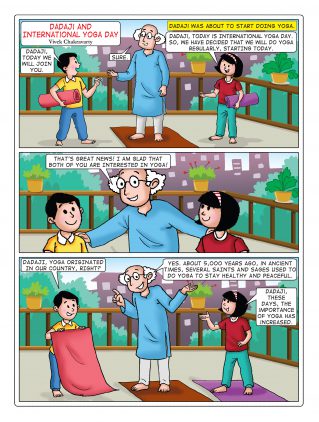
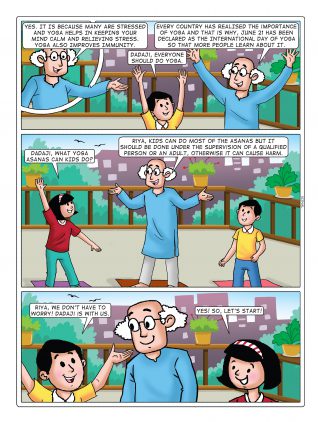





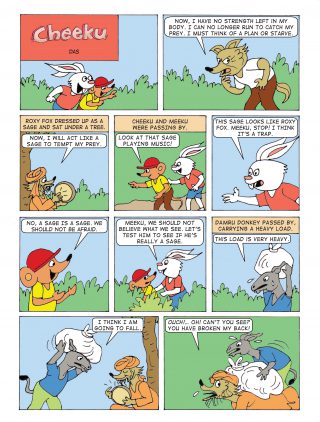
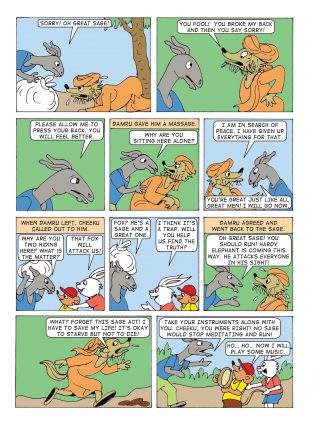
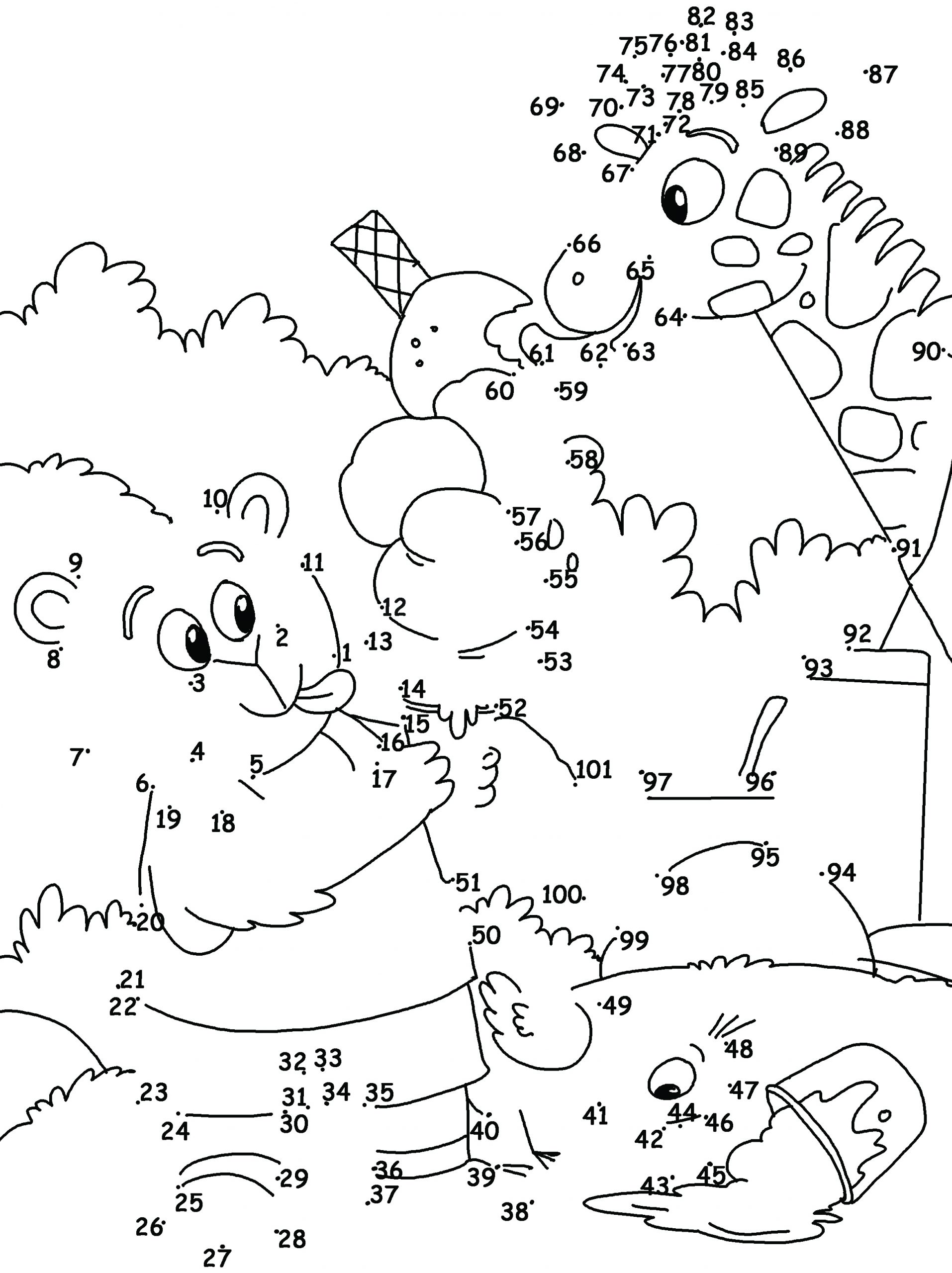
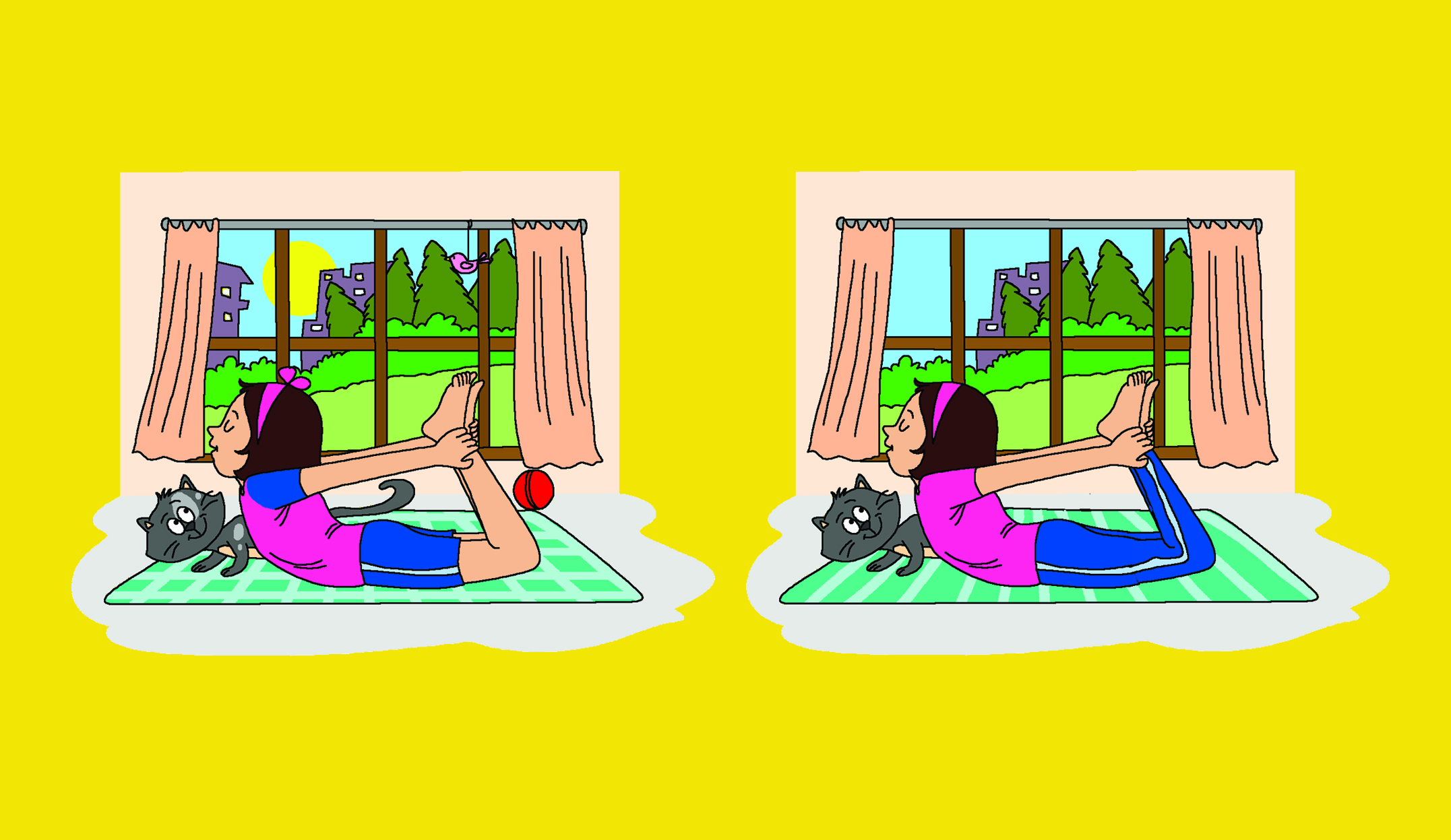
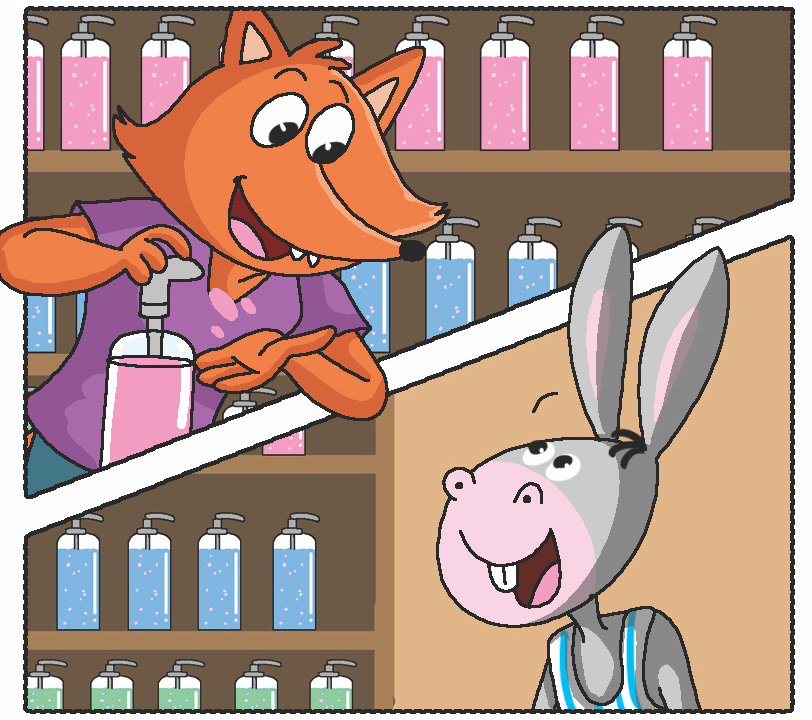
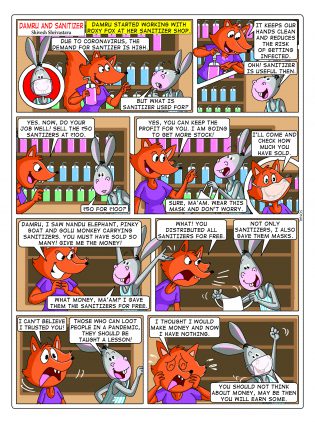
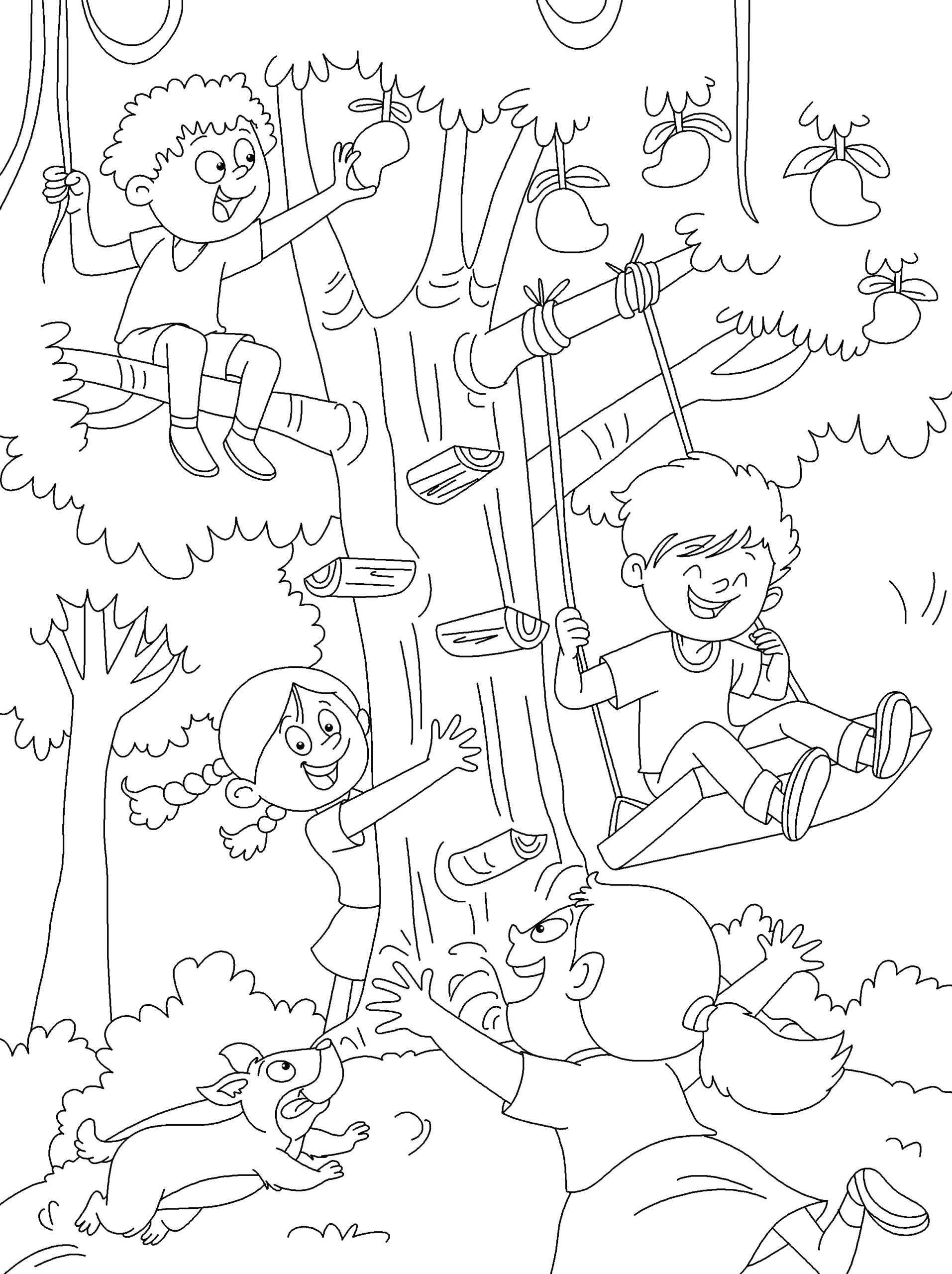
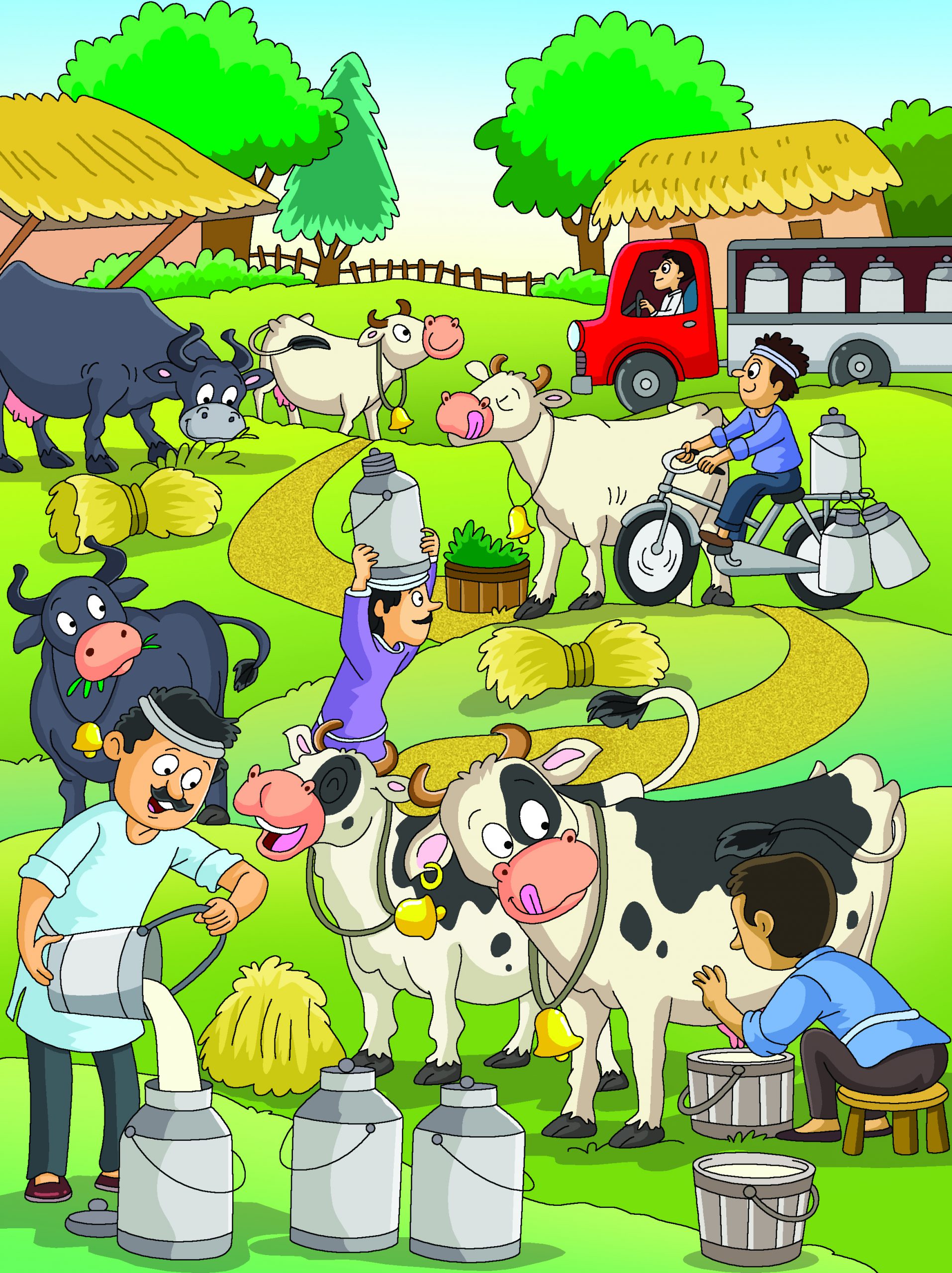
World Milk Day is observed on June 1. Look at the picture and answer the questions.
Q1. How many animals can you count?
Q2. At the milk farm, what is collected and distributed?
Q3. How many pails is the man on the cycle carrying?
Q4. How many pails can you count in total?
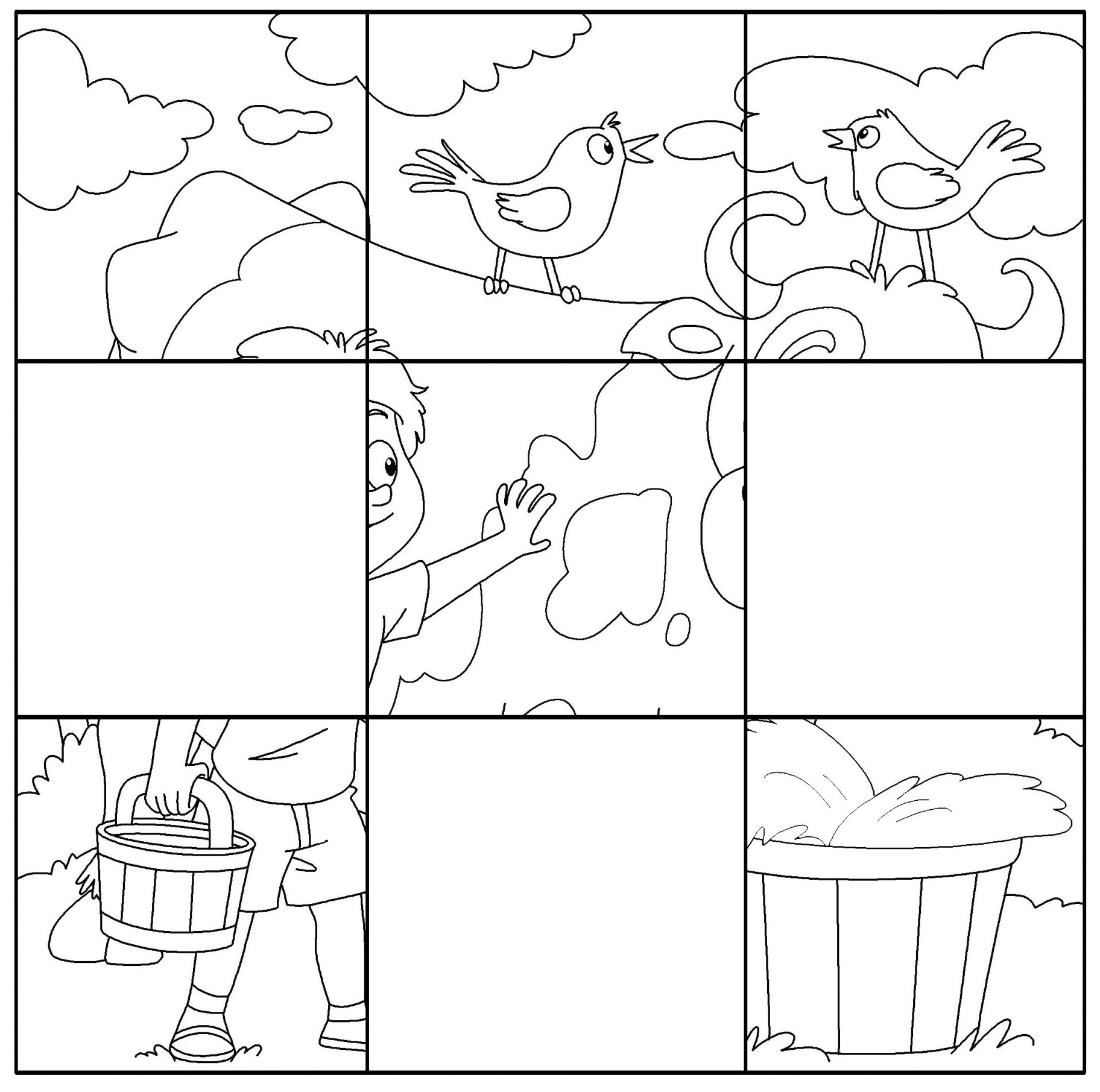
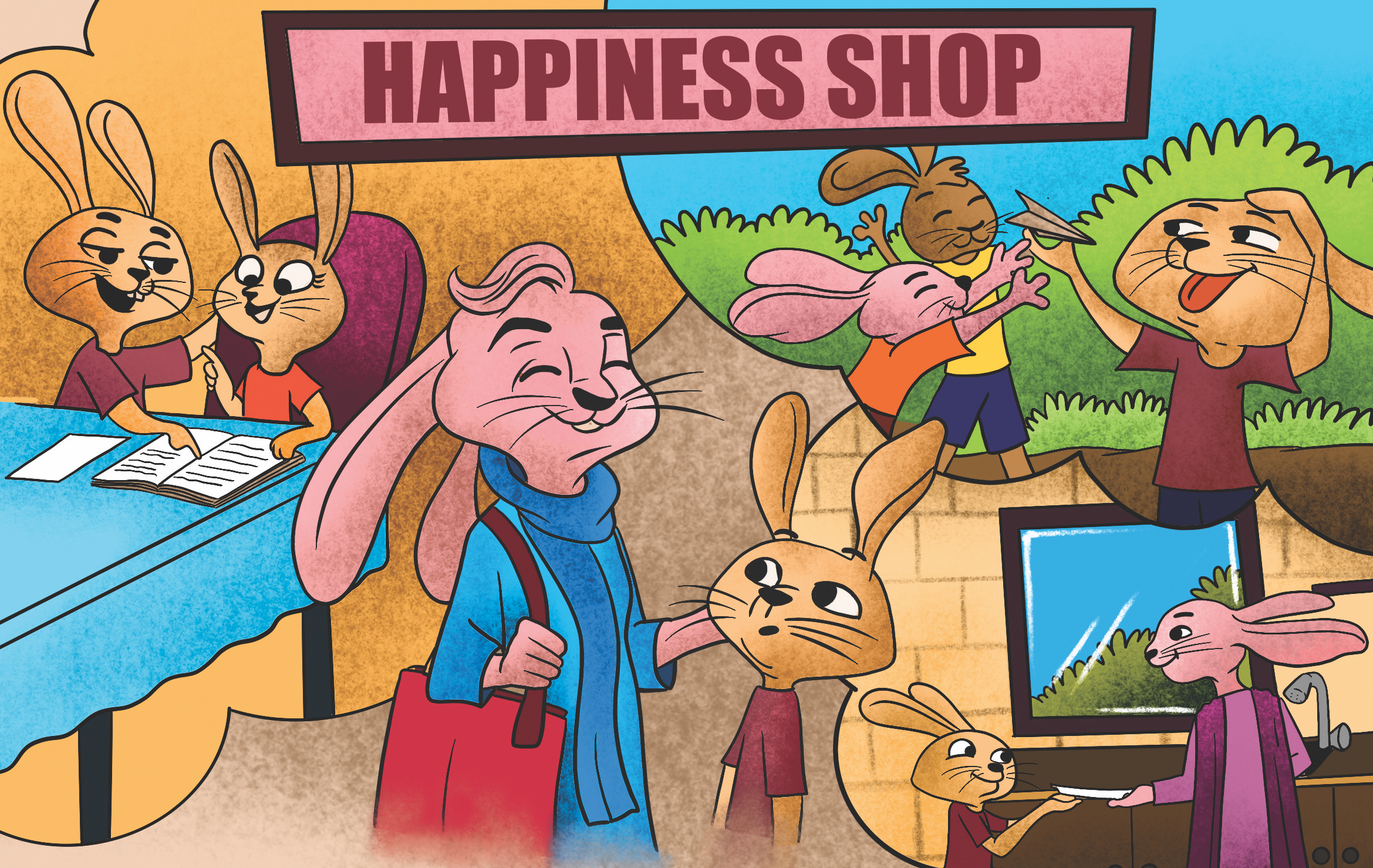
Vicky rabbit was fond of eating chocolates. He fought with his younger brother and sister because they unknowingly ate his chocolate that was kept in the fridge.
He was angry and sat quietly in one corner. Suddenly, the doorbell rang as aunt Ruby came to visit them.
Seeing Vicky sit quietly, she asked, “What’s the matter? Have you all fought again?”
Vicky’s looked up at aunt Ruby, trying to smile. He was happy to see her as she had a chocolate shop. He was sure that she must have brought lots of chocolate for them.
Vicky narrated the incident that happened in the morning with his siblings. He didn’t like being angry but could not help it.
Aunt Ruby heard him out and then asked, “If I own a chocolate shop, do I have to go somewhere else to buy chocolates?”
Vicky bowed his head and said, “No, aunt Ruby.”
“This also means that we will always have enough of chocolates in our shop, right?” aunt Ruby asked.
“Yes, aunt Ruby,” replied Vicky.
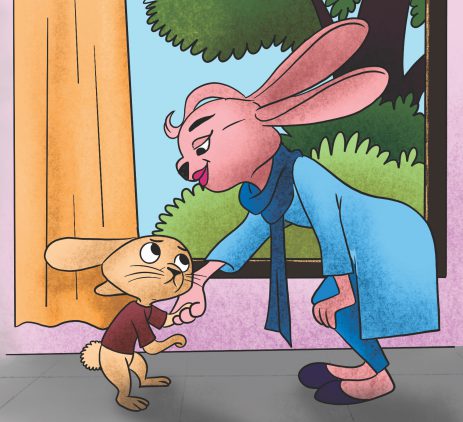
“Okay, so if you want to be happy, you need to open a happiness shop, so that you will always have enough, especially after you give it to others,” said aunt Ruby.
Vicky was surprised and said, “I never thought of it that way! But how can I open a happiness shop?”
“It’s very easy! Ever since you wake up in the morning, you have to help others and make them happy,” said aunt Ruby.
Confused, Vicky asked, “But how can I give happiness to everyone? Will they take it from me? Am I not too young to give happiness away?”
Aunt Ruby replied, “So what if you are young. There are many ways to give happiness. You can help your brother and sister in their studies, play with them, or share your things with them. Help your mother with the housework. You can help anyone if you wish to do so.”
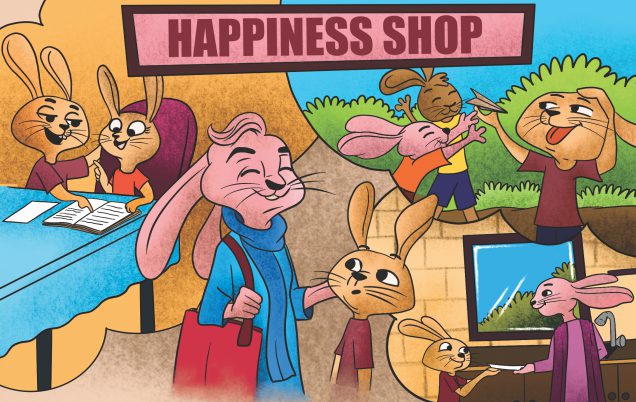
Vicky said, “I understood. Starting today, I will open my happiness shop.”
Next day, when Vicky was returning from school, he saw an old bear trying to cross the road and helped her.
He also carried her bag and dropped her home. The bear was happy and thanked Vicky.
When he reached home, his siblings were struggling to complete their homework. He helped them and shared his chocolates with them.
His siblings were happy to get an extra share of chocolate and that too from Vicky who loved chocolate so much.
In the evening, he helped his mother clean the house who was happy to see Vicky voluntarily helping her.
Vicky was satisfied with all he had done during the day.
Next morning, he heard his father tell his mother that some senior citizens are living alone in a house nearby. They were struggling to get things from the market.
Vicky took permission from his parents and helped the senior citizens to buy what they needed on his way back home from school.
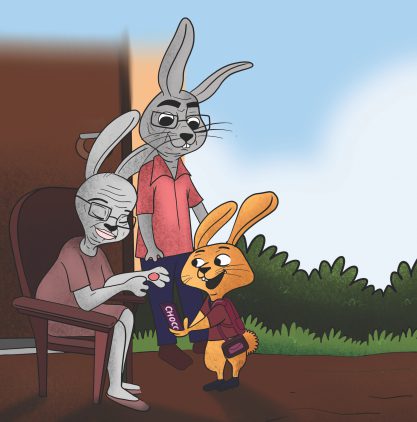
When Vicky had to buy many things, he and his father would go together as he couldn’t carry heavy items alone.
Vicky was delighted to help people and he realised that he was getting happier by the day.
A few days later, aunt Ruby visited Vicky again.
She looked at Vicky and said, “Looks like your happiness shop is running well.”
With a smile on his face, Vicky replied, “Yes, I am very happy about it! I will continue to share happiness with others as much as possible and run this shop of happiness forever.”
Aunt Ruby smiled and gave Vicky extra chocolates for his good work.
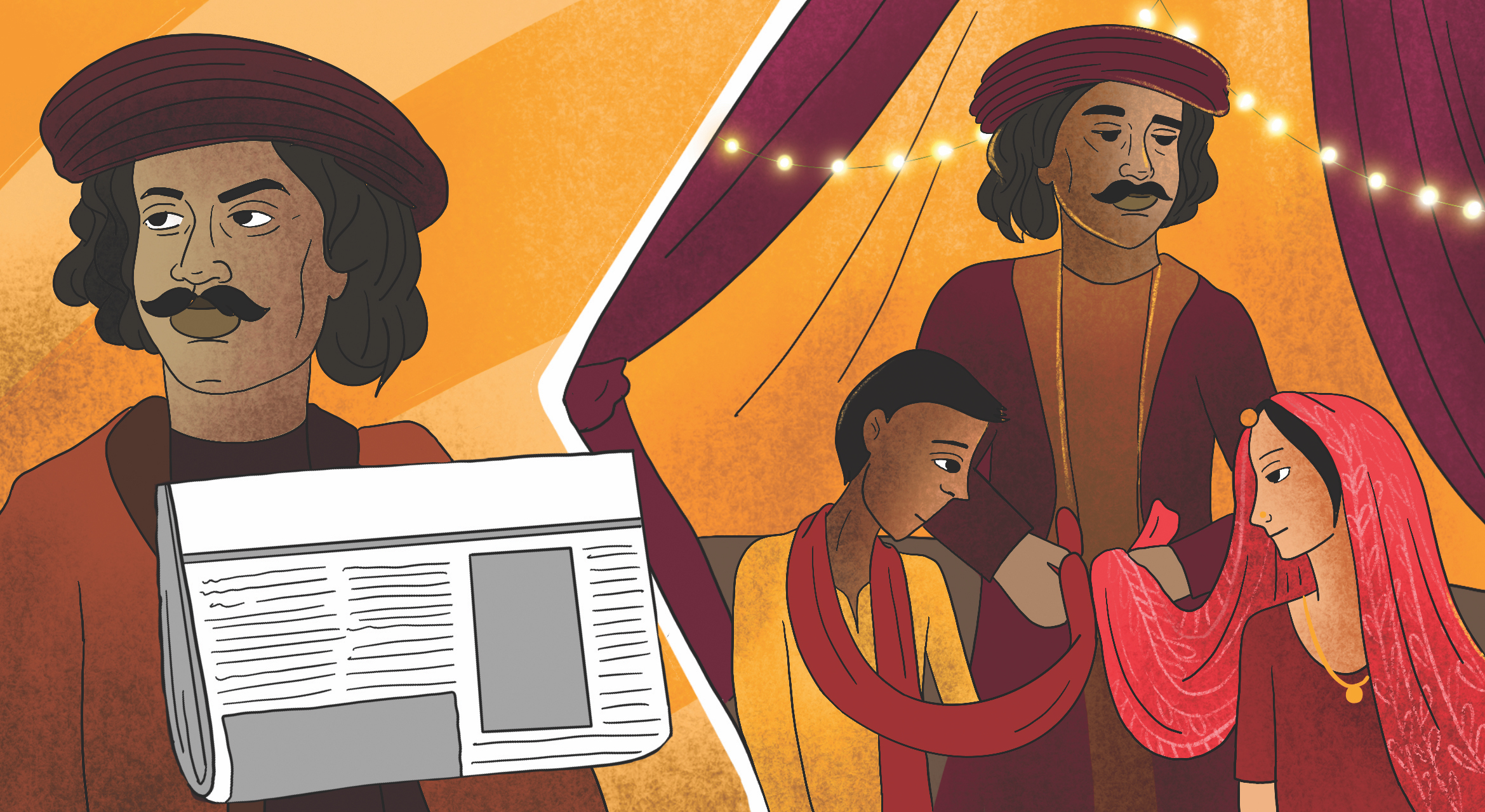
We live in a modern, progressive and independent India. But who was the first Indian who laid the foundation to this modern nation where people are allowed to talk freely? Undoubtedly, it was Raja Ram Mohan Roy.
Ram Mohan was born on May 22, 1772, in the Hooghly district of Bengal. His father, Ramakant Roy, was a wealthy landlord and his mother, Tarini Devi, was a religious woman.
When Ram Mohan was born, the condition of the country was miserable. People in India practised several evil acts like the purdah system where women had to cover themselves from head to toe or be hidden behind high walls and curtains outdoors and even inside their homes; Sati—a practice where widows had to jump in the funeral pyre of their dead husbands; child marriage, an act where children below the age of 18 were married; and female infanticide where newborn female babies were killed. These social evils were practised throughout the country.
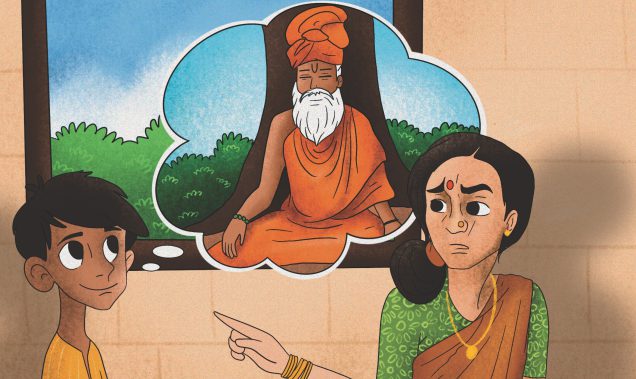
Many people in the country were not educated and believed in superstitions, which made the society unsafe, especially for women who had to do what they were told. There was no hope of improvement.
But just when all hope was lost, Ram Mohan came forward and took the responsibility to reform the society. But his path was not easy. He faced constant resistance everywhere, be it at home or outside.
He, too, was a victim of child marriage. He was first married when he was 9 years old. His first wife passed away at a very young age and soon his second marriage was held at the age of 10. He had two sons—Radhaprasad and Ramaprasad. His third marriage was with Uma Devi in the late 1820s.
At the age of just 14, he wanted to become a monk. But his mother opposed his decision and he let go of his ambition.
Soon, he travelled to Patna to study Arabic and Persian languages.
In Kashi (now known as Varanasi), he learned Sanskrit from the pundits and also studied the Vedas and the Upanishads— ancient Sanskrit literature that taught him to believe in the truth and accept nothing but the truth. The Vedas taught him that idol worship is unnecessary as God doesn’t have a body and is pure and cannot be created by man.
These lessons had a great impact on Ram Mohan and he began to question idol worship and several religious rituals.
This led to a life-changing incident in his life. His father was a devoted idol worshipper while Ram Mohan wasn’t. One day, a debate broke out between him and his father about idol worship.
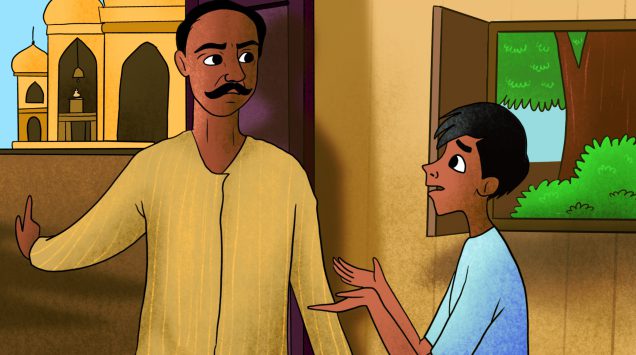
Ram Mohan said, “Father, why do you worship idols? You should only believe in god. The idols are created by man and worshipping them is meaningless!”
His father was deeply offended and said, “Where did you learn such nonsense? Idol worship is a means to reach God.”
“Father, why not worship him directly? What’s the need for a medium for that?” asked Ram Mohan.
The argument enraged his father and Ram Mohan left his house.
In 1803, when his father passed away, he began opposing idol worship and rituals openly.
He supported monotheism as described in the Vedas. Monotheism means all gods are one and only have different names.
He deeply believed in it and wrote a book in Persian called Tuhfat-ul-Muwahidin or The Gift of Monotheism.
In 1805, he met John Digby, a British officer who taught him English. This helped him understand the lifestyle and practices of people in English-speaking countries.
From 1809 to 1814, Ram Mohan lived in Rangpur city (now in Bangladesh). While earning for his family, he met people of all religions. He understood that to fight social evils, he would not get any support from society. So, he kept increasing his knowledge and experiences.
In 1814, Ram Mohan moved to Kolkata. In 1815, he founded the Atmiya Sabha—an organisation that invited people to share their ideas.
In 1817, he founded the Hindu College in Kolkata to promote modern education and English language. He wanted the number of literate people to increase as only then would they question the society and its evil practices. He believed that educated people will think rationally.
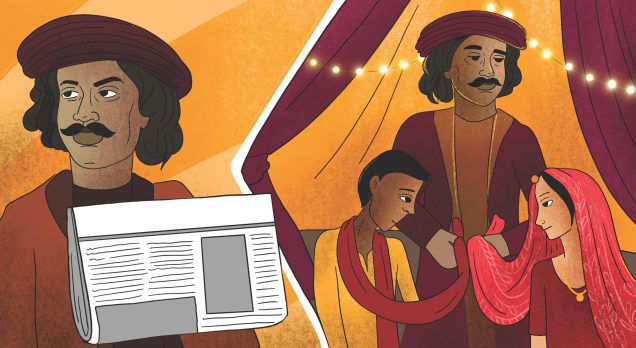
Ram Mohan’s work against the practices of the society was not welcomed by many and he had to face several challenges but he never lost courage and kept fighting and spreading awareness.
To reach the masses with his teachings, in 1821, he launched a Bengali newspaper Samvad Kaumudi and a Persian newspaper Mirat-ul-Akhbar in 1822.
In these newspapers, he wrote about the evils prevailing in the society like Sati, child marriage, purdah system and many others. His writings encouraged people to think about reforming the society.
People were forced to think:
“Why do we get children married when they are supposed to play at that age?”
“Why do we burn women alive on the funeral pyre?”
“What is the need for keeping women behind the purdah and separating them in society?”
“Why can’t we let widows have a new life of dignity by getting them remarried?”
The exact answers to such questions could be found in the writings of Ram Mohan. This marked the beginning of a reformed society.
In 1828, he founded the Brahmo Samaj and continued to fight for various social reforms through this organisation.
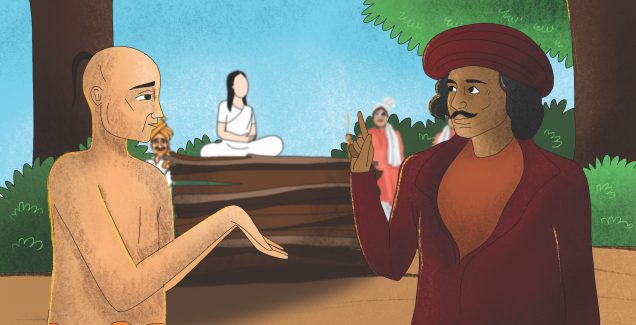
He achieved success in some parts of the country.
But Ram Mohan’s biggest success was the abolition of Sati. The practice of burning the wife alive on the husband’s funeral pyre was carried out for hundreds of years. It was a terrible practice where the woman was forcibly burned.
Ram Mohan took the battle of Sati from India to England. Due to his efforts, the British government banned Sati on December 4, 1829.
In 1831, the Mughal Emperor Akbar II gave the title of ‘Raja’ to Ram Mohan Roy.
He died on September 27, 1833, in Bristol, England. In his honour, the British government named a pedestrian path in Bristol as ‘Raja Ram Mohan Walk’.
Rabindranath Tagore, a famous poet, described him as the Father and Maker of Modern India.
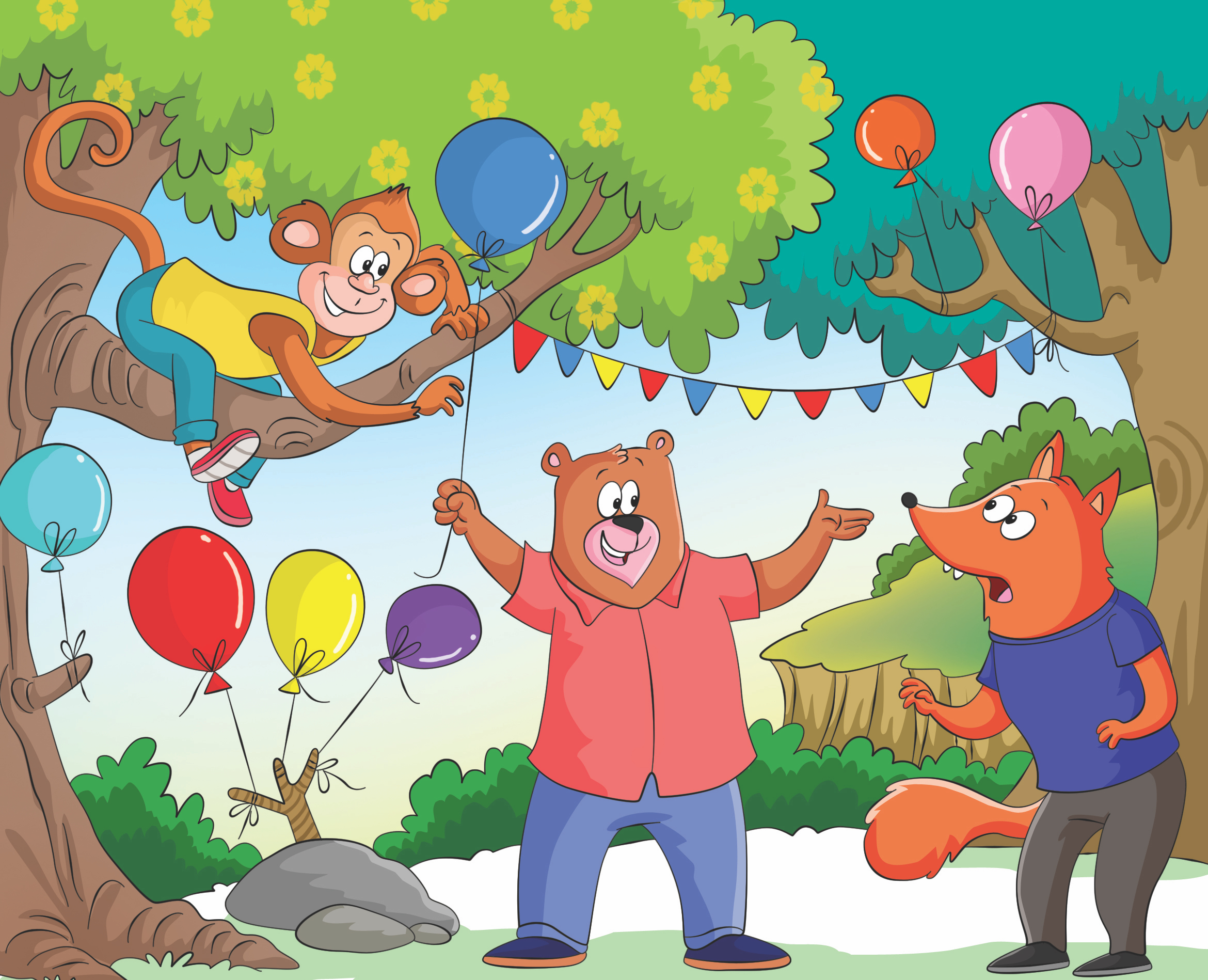
Baddy fox wanted to cut the trees of Champakvan. He did not know why, but he disliked the animals of Champakvan and was always thinking of new ways to harm them.
“If there are no trees, then the forest will be destroyed by itself. The animals will suffer from hunger, heat and shelter. And that’s what I want,” Baddy told this to the woodcutter with a cunning smile.
“Yes, and I will get to sell the tree in the city for a profit,” said the woodcutter picking up his axe.
“We must work cleverly and no one should know our plan,” said Baddy.
“No one will know. Otherwise, it will be tough to cut the trees,” the woodcutter agreed.
“Tomorrow, I shall go to Champakvan and figure out which day you can begin cutting the trees,” said Baddy.
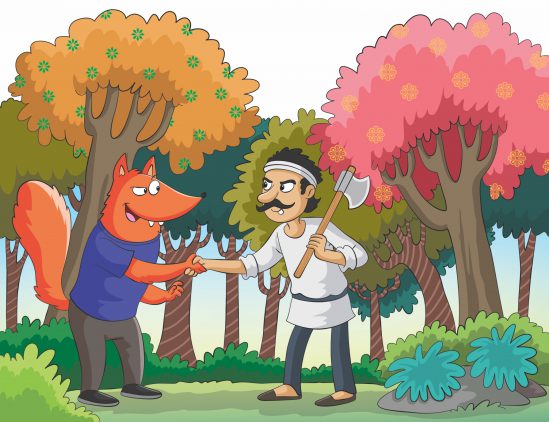
“Let me know when you think the time’s right and I will come with my companions and axes and saws,” replied the woodcutter and bid goodbye to Baddy.
Next day, Baddy went to Champakvan. The forest was beautifully decorated. Colourful ribbons were tied to the trees. Fairly lights hung from every branch. The animals had decorated their homes. Baddy was curious and wanted to know why the forest had been decorated.
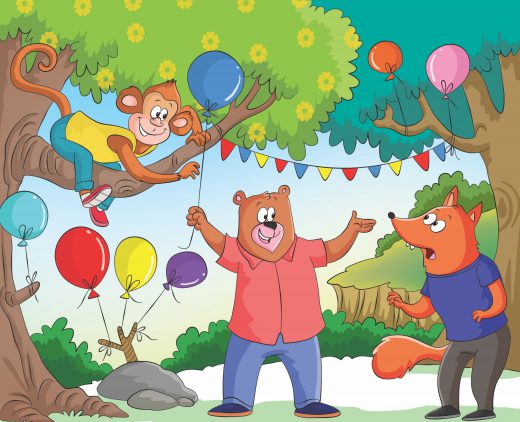
Just then he saw Blacky bear handing balloons to Jumpy monkey on the tree.
“Blacky, what is happening in the forest? Why is it decorated so beautifully? Is there a wedding happening?”
“Don’t you know?” asked Blacky looking at Baddy in surprise.
“No. That is why I am asking you,” said Baddy, rolling his eyes.
“June 5 is Environment Day. We are making these preparations to celebrate that great festival in Champakvan,” replied Blacky.
“Oh! So these decorations are for Environment Day,” whispered Baddy to himself.
“Did you say something?” asked Blacky.
“No, no! I didn’t,” muttered Baddy and walked away.
At the Brave Hardy Crossing, the main crossing of Champakvan, named after one of its scientists, many animals had gathered. They were discussing something important amongst themselves. Baddy wanted to know what they were talking about, so he sat down quietly at one side to listen to them.
“We should ask King Shersingh to be our chief guest,” said Dola deer.
“But he is from our forest. How can someone from our forest be the chief guest? We should look for someone else,” said Cheeku rabbit.
“You are right, Cheeku. If we get someone from Sundarvan, it will be better. When they see the environment celebrations, they will go back and praise our forest in their forest,” said Greta giraffe.
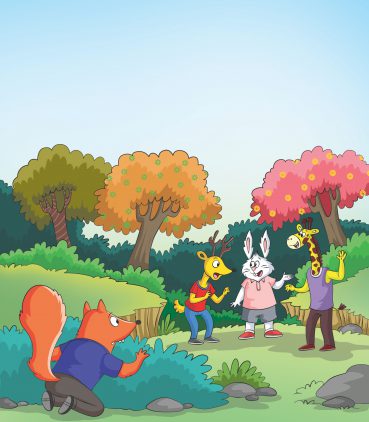
“Whom can we invite?” asked Cheeku and scratched his head.
“How about Baddy fox?” suggested Dola.
“No! No! Baddy always wants to harm Champakvan. How can we make him our chief guest?” Cheeku objected.
“Maybe Dola is right. Baddy may be planning against Champakvan, but we never think of harming him. Perhaps, when he is invited as our chief guest, he may improve and become a good person,” said Greta.
All agreed with Greta’s suggestion. Suddenly, Cheeku caught sight of Baddy, sitting behind a bush, quietly.
“Look! Baddy is here. Let us go and invite him for the function,” he said excitedly.
All animals went to Baddy and invited him to be their chief guest.
Baddy had been feeling uneasy listening to the conversation, and now he was more troubled. He could not even think how of a fitting reply.
“I…I…,” he stammered and then said, ‘’I will surely come.”
On his way back, Baddy started wondering about what had happened. “Here, I was thinking of harming Champakvan and these animals are inviting me to be their chief guest.”
On the day of the function, Baddy came to Champakvan forest. He was given a very warm welcome and presented a garland of fresh flowers and made to sit on the sofa comfortably.
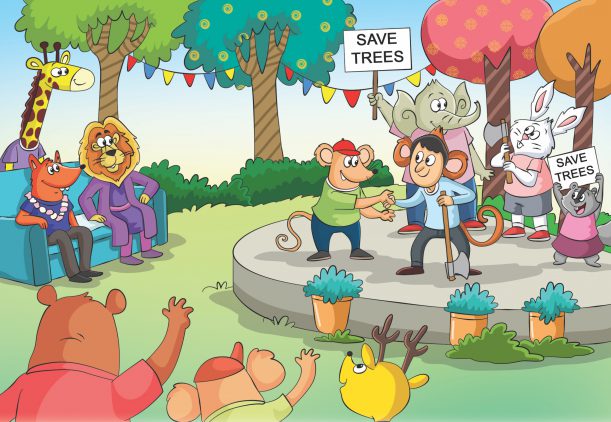
The animals of the forest put up skits telling everyone the importance of trees and why more trees should be planted. They said in chorus, “Fewer trees means heating of the atmosphere, less rain and homes will disappear.”
Baddy became thoughtful and realised he would have done something horrible if he had cut the trees. He decided that he would never again harm the trees of any forest.
He would also stop the woodcutters from cutting trees.
The function came to an end and the animals requested Chief Guest Baddy to address the gathering with a few words.
“I am very happy to be here and I promise that from today, I will not harm the trees in any way. I promise to plant 100 trees in Champakvan and look after them.”
Hearing him, all the animals were very happy. Baddy had truly been transformed.
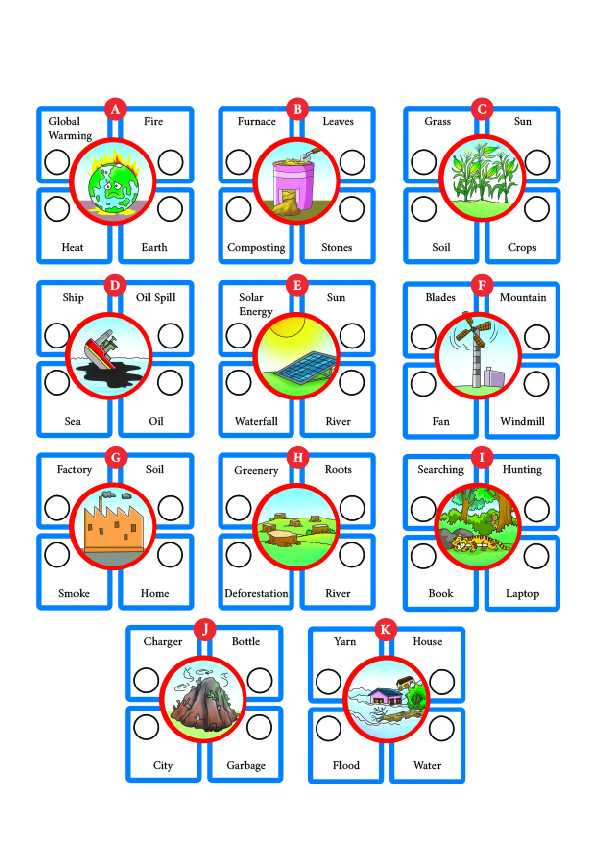
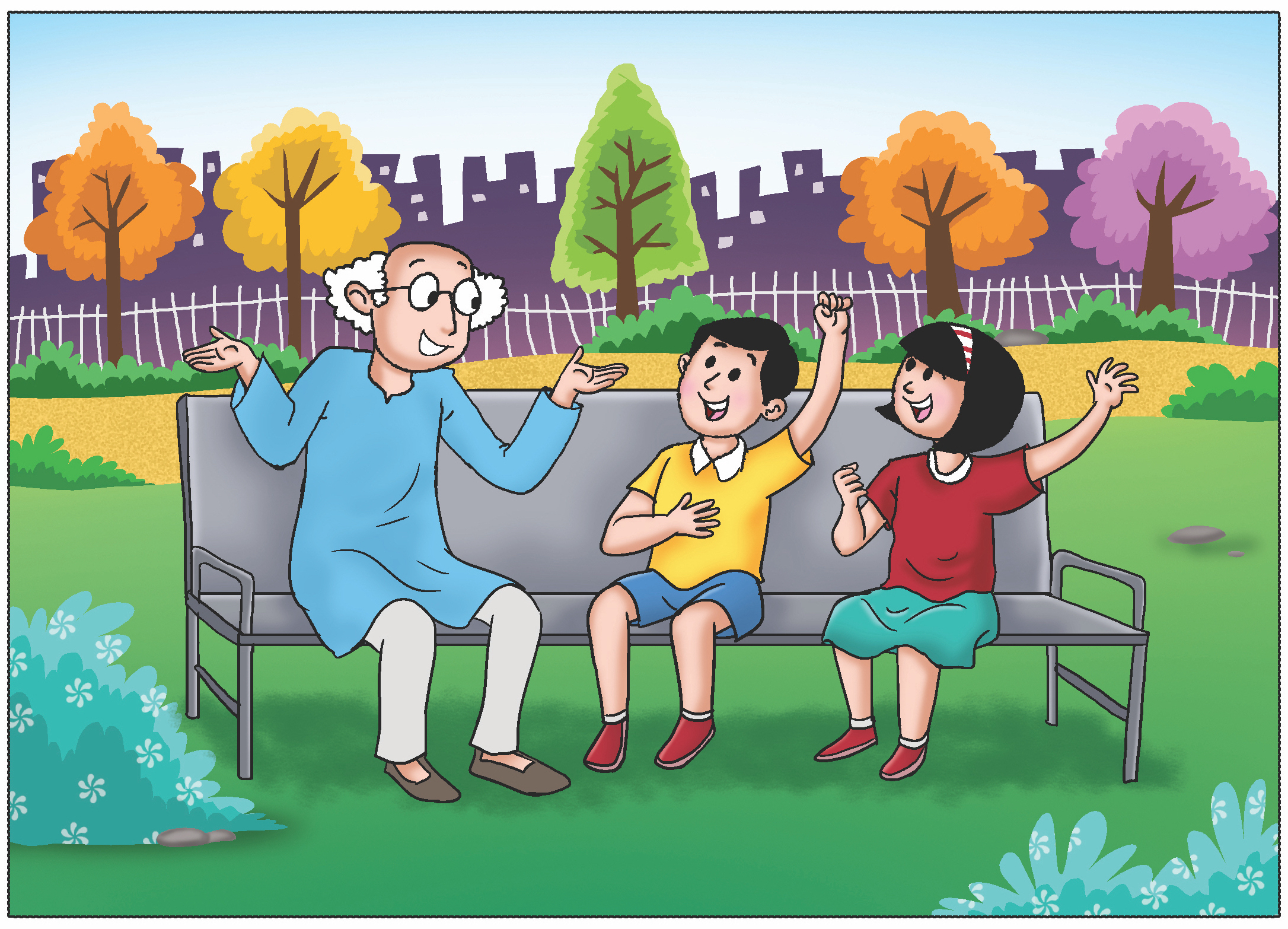
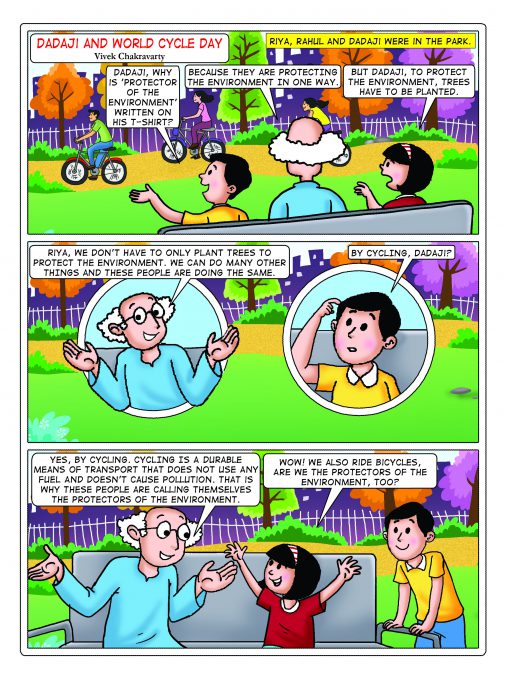
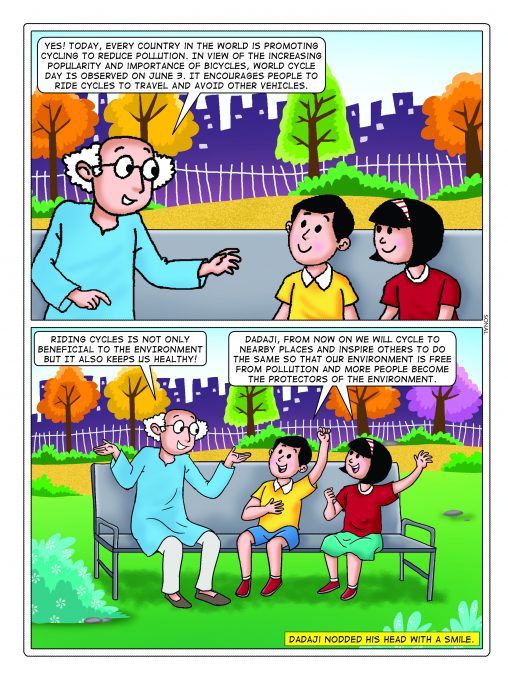

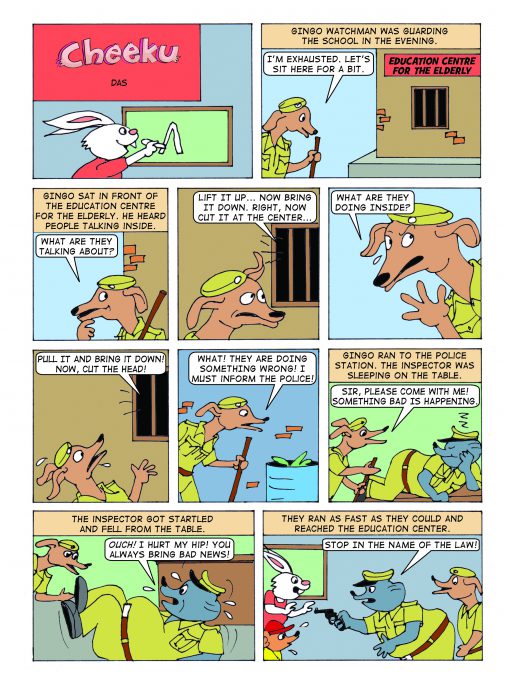
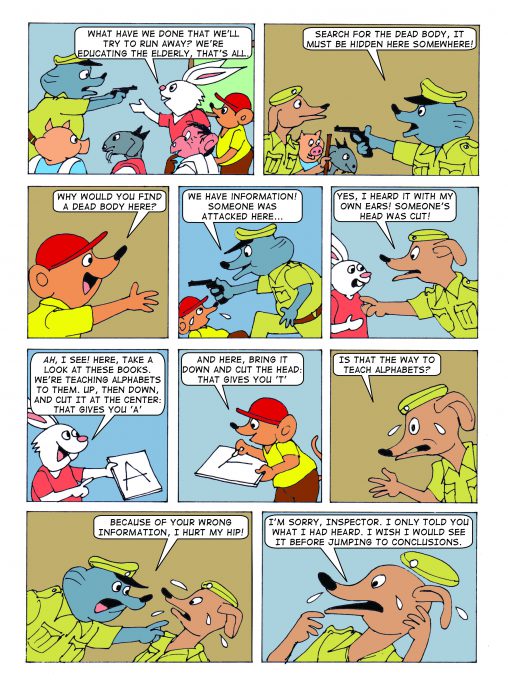

Humans build houses and divide them into rooms—kitchen, bedroom, toilet, bathroom, etc. Naked mole rats do the same.
Naked mole rats are mammals found in Eastern Africa. Like how we build houses, they dig out burrows or tunnels in a systematic manner where they form a line to dig. The animal at the front of the line starts digging and those lined up behind it sweep the dirt backwards until the last animal in the line kicks the dirt out.
These underground tunnels are separately dedicated to nesting, eating and farming. Naked mole rats have a separate burrow to eliminate waste. Once the toilet burrow is full, they cover it with fresh soil or block it and dig up a new one. They are said to be one of the most hygienic rodents.
Up to 300 mole rats can be found in a single colony that spreads over a distance of around six football fields.
Naked mole rats run backwards as fast as forwards.

Reema, an athlete, has lost two pairs of sports shoes, track suit, a pair of sweat bands, fitness watch and water bottle. Help her find them!
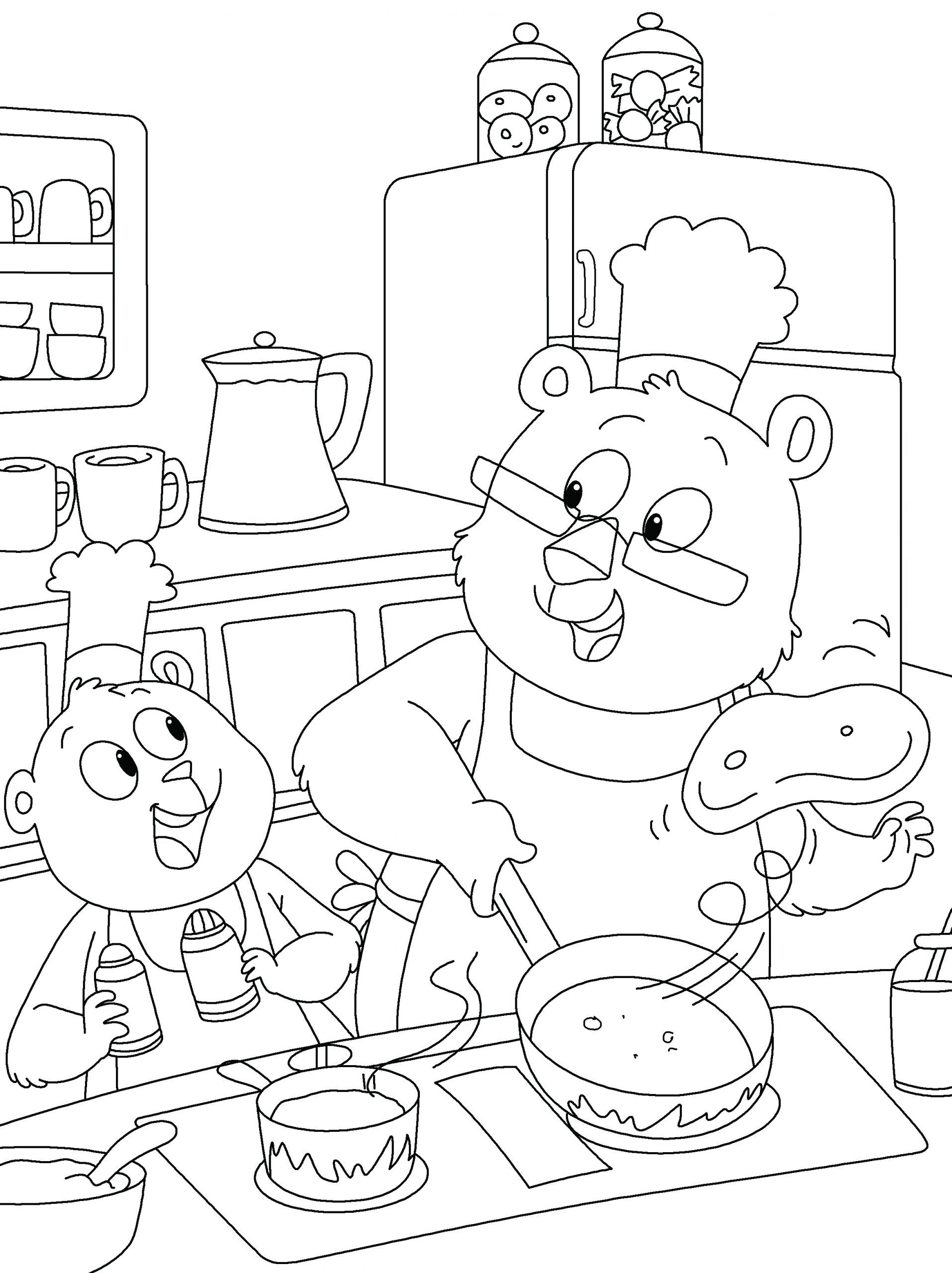

“How hot it is! When will it rain, mom?” asked Bolt, Misha cheetah’s cub.
Anandvan forest had no rains. Animals did not have enough food. The forest had always been short of water and now, whatever little water was there, quickly dried up under the hot sun.
The days were hot and dry, and the nights were eerily uncomfortable. Birds and animals with fur like bears were suffering the most.
Misha lived in the forest with her cubs.
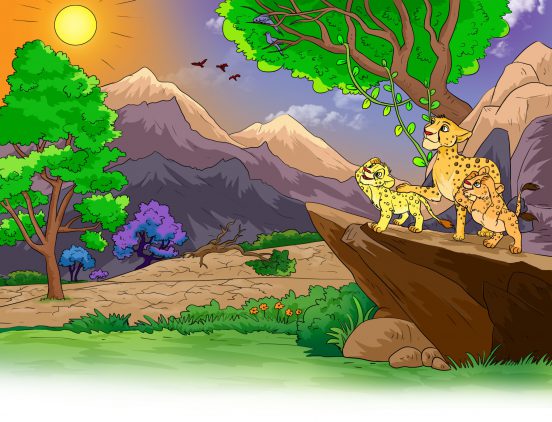
Clouds would form in the sky every day but would break without rain. The months of monsoon passed, but not a drop of rain fell from the sky.
Drought was declared in the forest. The Forest Administration advised all animals to move to other forests.
When the animals started migrating with their kids, the hawks arrived from other forests and said that animals from other forests were moving towards their forest. There was a drought everywhere and no one knew where to go.
The animals called for a meeting. It was decided that no animal would eat another during the meeting.
Deer, squirrels, buffaloes, zebras, cheetahs, tigers, bears, foxes, and rabbits—all came together.
King Sheru said, “Friends, we are facing drought because of the human race.
Because they believe they are superior, they have cut down trees and destroyed forests, constructed dams over rivers, drying them, and leading the planet towards destruction. The weather has altered. It doesn’t rain during monsoons, it isn’t cold during winters, and summers are increasingly hot. Our food chain is being destroyed because of no food and bad water.”
“So we too must destroy the humans.
Down with humans!” shouted Foxy fox.
The others repeated after him, “Down with humans! Down with humans!”
The whole forest started chanting in hatred of humans.
“Quiet!” said King Sheru in his firm voice and everyone fell silent. “Tonight, we shall attack the human city closest to the forest and take their food and water. They too should know what it feels like when they starve.”
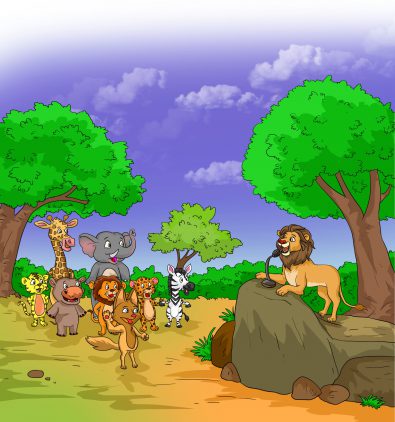
The animals clapped at their king’s decision and waited for nightfall. As soon as the sunset, tigers, bears, jackals, and cheetahs crossed the forest borders to hunt the human territory.
But the humans had good security systems in place, so the animals could not do much and just about escaped the traps set for themselves and returned.
The news about their failure spread through the forest.
King Sheru called for another meeting.
Some hyena who had been beaten up by the humans were standing in one corner and shivering with fear.
“Residents of the forest! We can’t live in fear! We must keep fighting! In this struggle for survival, we must…”
But before King Sheru could finish, Misha interrupted him and said, “Your majesty, with your permission, may I say something?”
Misha was loved and respected by everyone because she was a wise animal who found solutions without blaming or fighting.
The king nodded, and Misha said, “Friends! Our fight is not with humans but with what they have done. They have misused their knowledge and have caused destruction to nature. The earth is heating up. The glaciers are melting but not just us, the humans too are suffering because of it. In some years, they too will face scarcity of food and water.”
Everyone listened to her attentively.
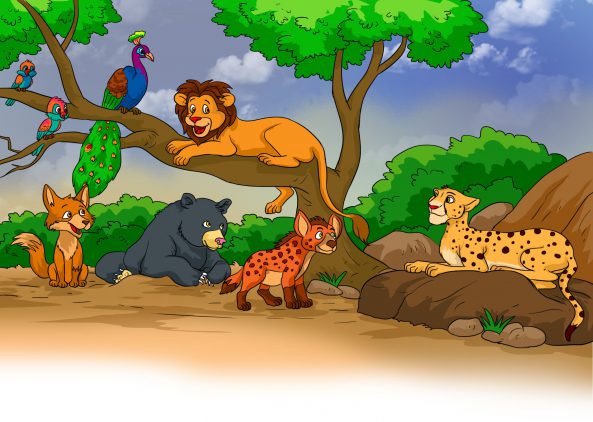
“If we attack humans,” continued Misha, “we will not survive. They are stronger than us.”
Some animals, like the hyenas, who had been beaten agreed with her, but the others still wanted revenge.
“Do you have a solution to the problem, Misha?” asked the king.
“I do, your highness, but it’s going to be time-consuming and slow,” said Misha.
“Do tell us!” said the animals.
“We should try and grow our own food instead of stealing food and water from humans. Everyone will have to work hard and have the patience to see the results.
If it does not work, we will try another way,” she said and explained what had to be done.
Next morning, the work started. Barren lands were dug by oxen and birds got the seeds sown. Elephants and bears got water from far away lakes that still had water.
All the animals and birds contributed to the cause based on their skills and all helped each other.
Working hard, they believed Misha’s plan would bear fruits. They knew about farming as they had seen humans do it.
Days passed into weeks. But neither did the weather improve, nor was there any sign of food.
All their hard work seemed to have failed.
They started thinking they would rather have stolen food. They decided to go and attack humans and called for a meeting with their king.
They had only just reached his cave when lightning struck. The entire forest lit up in a flash and it started raining. Where seeds were sown, saplings appeared and the lakes started filling up.
With the crops growing, food problems also slowly began going away. Since the herbivores could now eat, the carnivores were hopeful about having food too.
Misha’s plan had worked, though it took time.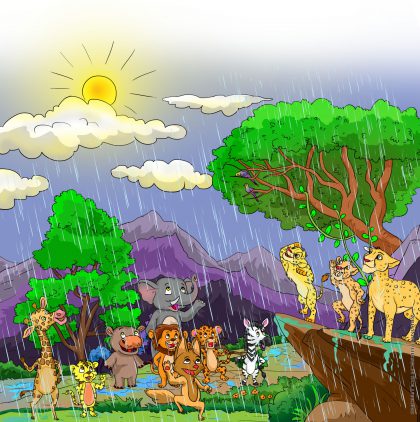
If they had attacked humans, there was no guarantee of a continuous supply of food and water.
They had learnt that if you wish to do something, the best way was to “do it yourself.”


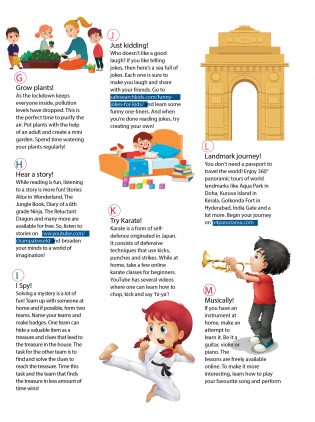
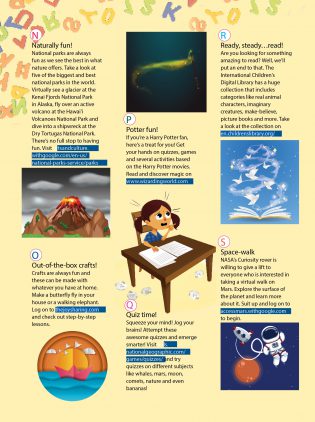
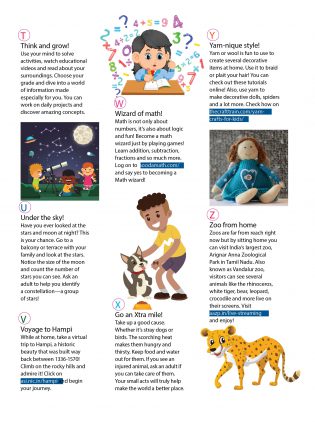
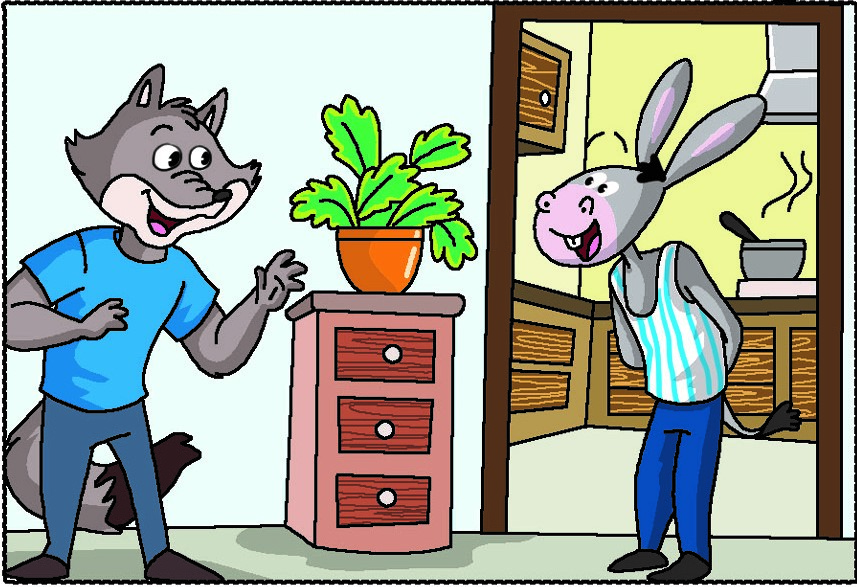
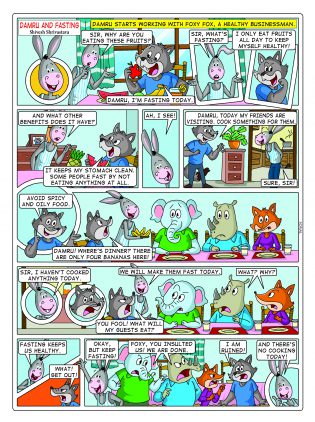
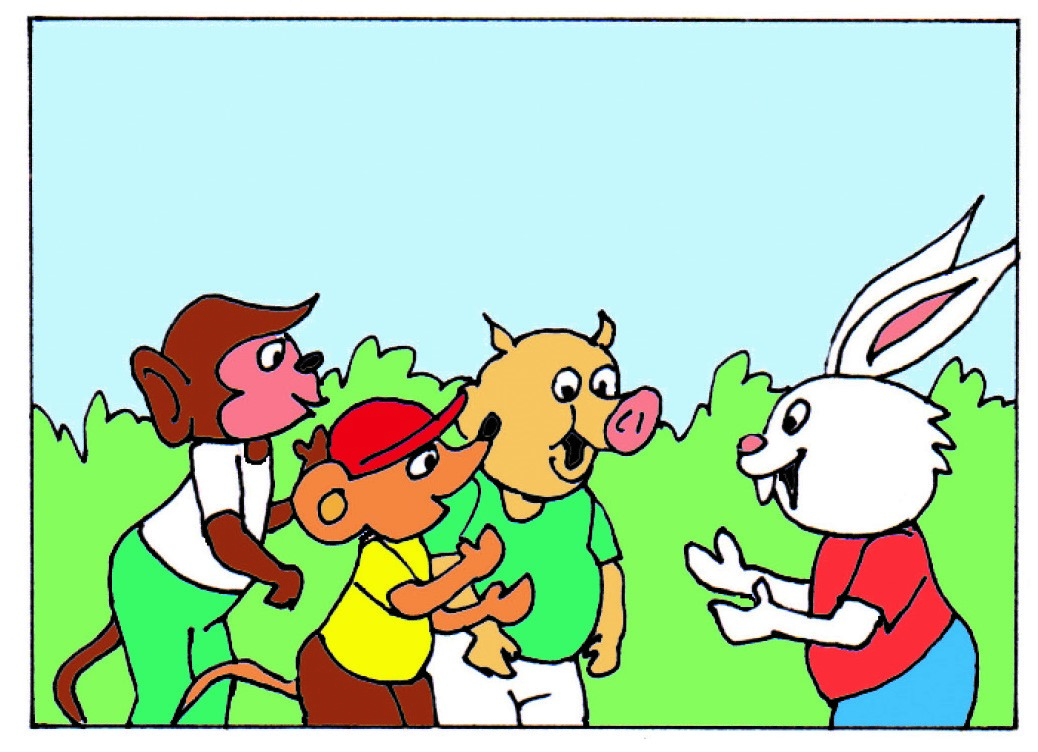
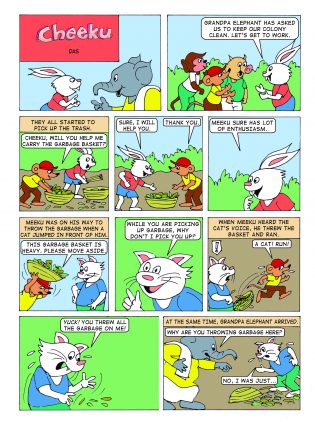
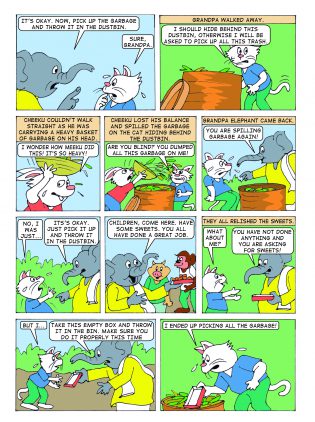
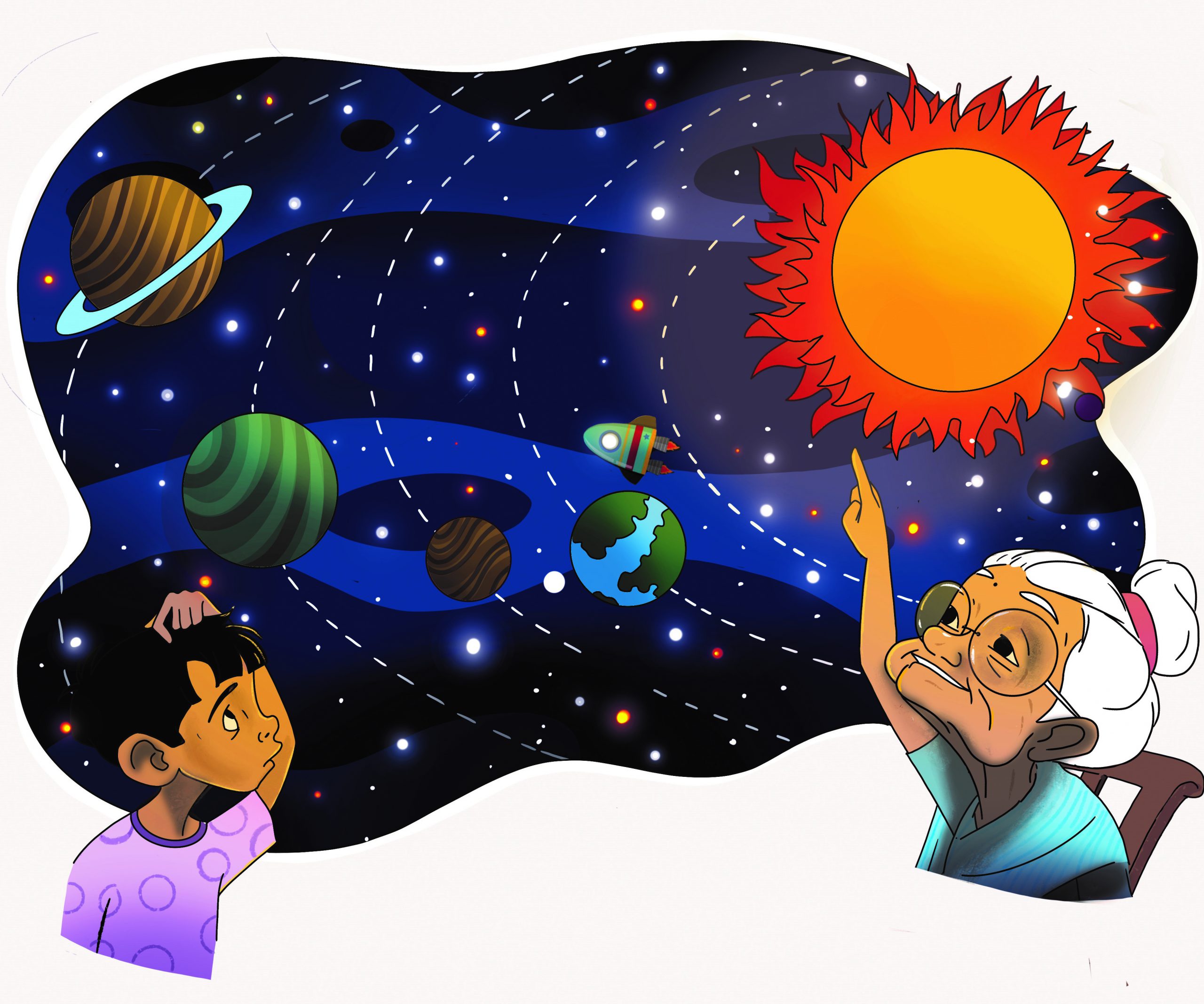
Rahul saw Vikram Lander reach close to the Moon on television.
Vikram Lander had been sent to look for water on the Moon. After hearing this news, Rahul went straight to his dadi and said, “Dadi! The story you had told me about the Moon is not true.”
Dadi did not understand what Rahul was saying. “Rahul, what story are you talking about?” she asked.
“Dadi, you had told me that the Sun and the Moon were brother and sister.”
“Yes,” said dadi. “And why do you say it’s not true?”
“But, dadi, how can they be brother and sister?” asked Rahul.
“They live far away from one another.”
“You mean to say that by staying far away, there is no relationship between brother and sister?” asked dadi.
“My brother lives 900 kilometres away from here in Mysore. It has been a long time since I met him. So, is he not still my brother?”
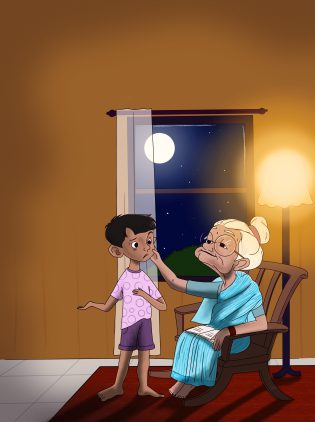
Rahul did not have a reply to this question. He was confused if he should accept the Sun and the Moon as brother and sister. He looked towards dadi questioningly.
To clarify, dadi prompted him, “Rahul, tell me, who are called siblings?”
Hearing this Rahul laughed. “Oh, dadi, that is very simple,” he came and sat near her. “Boys and girls who are born of the same parents are called brothers and sisters.”
“Do you know, the Sun and the Moon are born from the same universe? That’s why they became brother and sister. We consider the Earth to be the mother, so what is the harm in considering her children as brother and sister.”
“But why?” asked Rahul.
“The children serve their parents who look after their children during their childhood, is it correct or incorrect?” asked dadi.
“Yes, correct,” replied Rahul.
“Then tell me, what will happen if the Sun stops rising?”
“There will be no day.”
“Is that all?”
“Yes, that is all I know,” said Rahul.
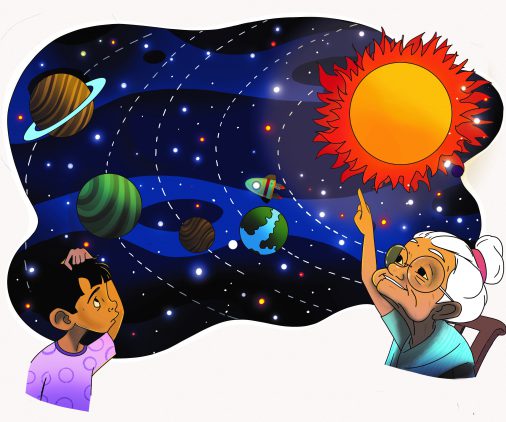
“Oh no!” said dadi, “It is not so. If the Sun stops rising, then the plants and trees cannot grow. There will be no fruits and flowers. It is so because the plants prepare their food from the Sun’s rays. In the presence of the Sun, they release oxygen into the atmosphere. If the Sun’s rays are not received, then there will be no plants and trees.”
“And if there are no plants and trees, what will we eat then?
This is what you want to say, isn’t it, dadi?” Rahul interrupted her.
“Yes, that’s right!”
“But, dadi, tell me, you are saying that the Sun and the Moon are brother and sister, and they play hide and seek every day? How is this correct?” asked Rahul.
“You must have seen the Moon rising at night. Some days, it rises early and some days late. Some days, it is small and some days it is whole. All these are its art, which we call Moon-art,” said dadi and Rahul nodded his head.
“The Moon revolves around the Earth, right?”
“Yes, dadi,” said Rahul, “And the Earth revolves around the Sun.”
“Yes. And because of this revolution, the rays of the Sun sometimes fall fully on the Moon and sometimes only partially. The Moon revolves around the Earth and the Earth around the Sun. Because of this, sometimes the Moon comes completely in front of the Sun and sometimes partly, and the other part is in darkness.”
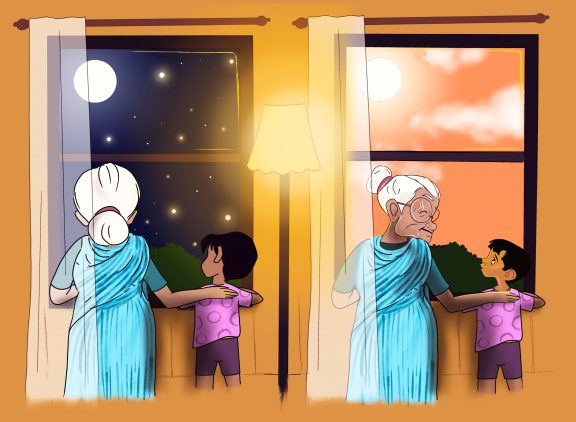
“Yes, dadi. I understand this,” said Rahul. “But if they are brother and sister, shouldn’t they live, eat and drink together.”
“As you know that the Earth is a planet; and the Moon is a satellite. Planets revolve around the Sun. This means they are lifeless. Then, how will they eat or drink?”
“But you had said that the Sun and the Moon had quarrelled and in anger, they went far away to live separately; and they did not come in front of one another. Then their mother made them make a compromise and they sometimes come to meet one another. But I do not understand how they can come from so far to meet one another.”
“You are right,” said dadi. “There is a lot of distance between the Earth and the Sun.”
Rahul interrupted her, “Not just a lot, dadi, but 15 crore kilometres.”
“Actually, the distance is 1,496 lakh kilometres.”
“No, dadi. You are wrong,” said Rahul.
“My dear, you are also right and I am also right. You are saying 15 crore kilometres; when I am saying four lakh kilometres less, which is the accurate distance.”
“What?” Rahul could not believe her words.
“Yes. This is correct, you can say 14 crores 96 lakh kilometres, which is 4 lakh kilometres less than 15 crore kilometres that you are saying.”
“Oh, dadi! You also know so much about the Sun and the Moon,” said Rahul hugging her. “I had thought that my dadi knows nothing.”
“After all, whose dadi am I?” she said. “I also read like you.”
“But dadi, are the Sun and the Moon actually brother and sister?” Rahul still asked.
Dadi replied, “Oh, dear! They are brother and sister in your dadi’s story. A story is the gift of one’s imagination. Because of stories, we learn to stretch our minds to imagine. And sometimes, our imagination may become a reality.
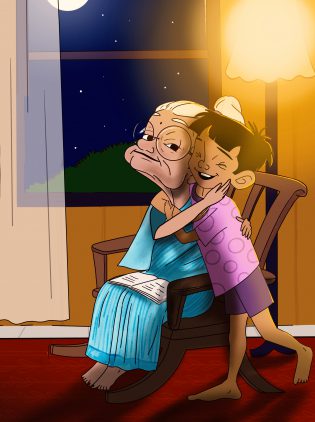
Hearing this, they both laughed.
“Actually dadi, the Moon of your story is really very lovely,” said Rahul and he put his head on her lap. Dadi stroked his head lovingly to put him to sleep.


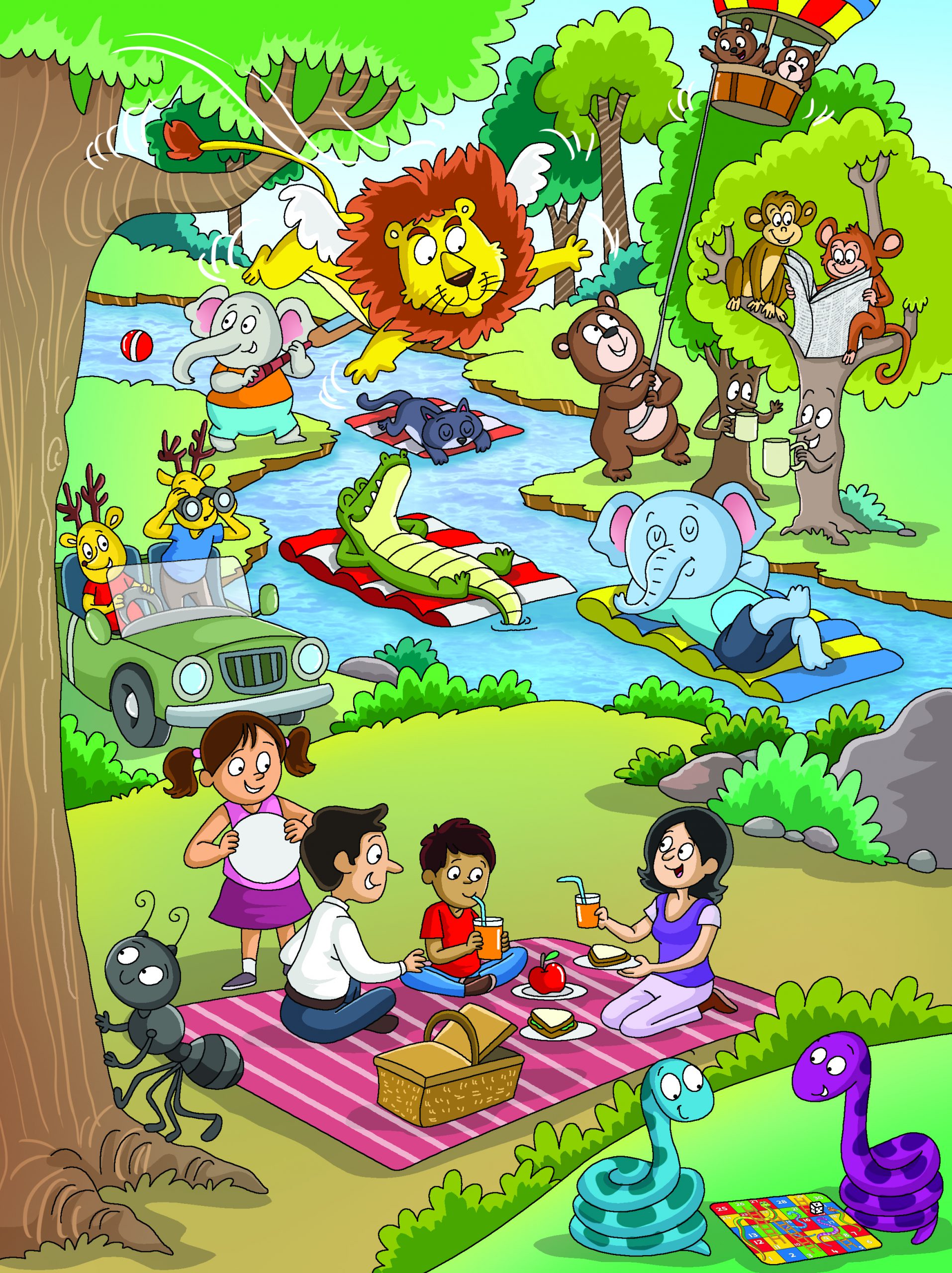
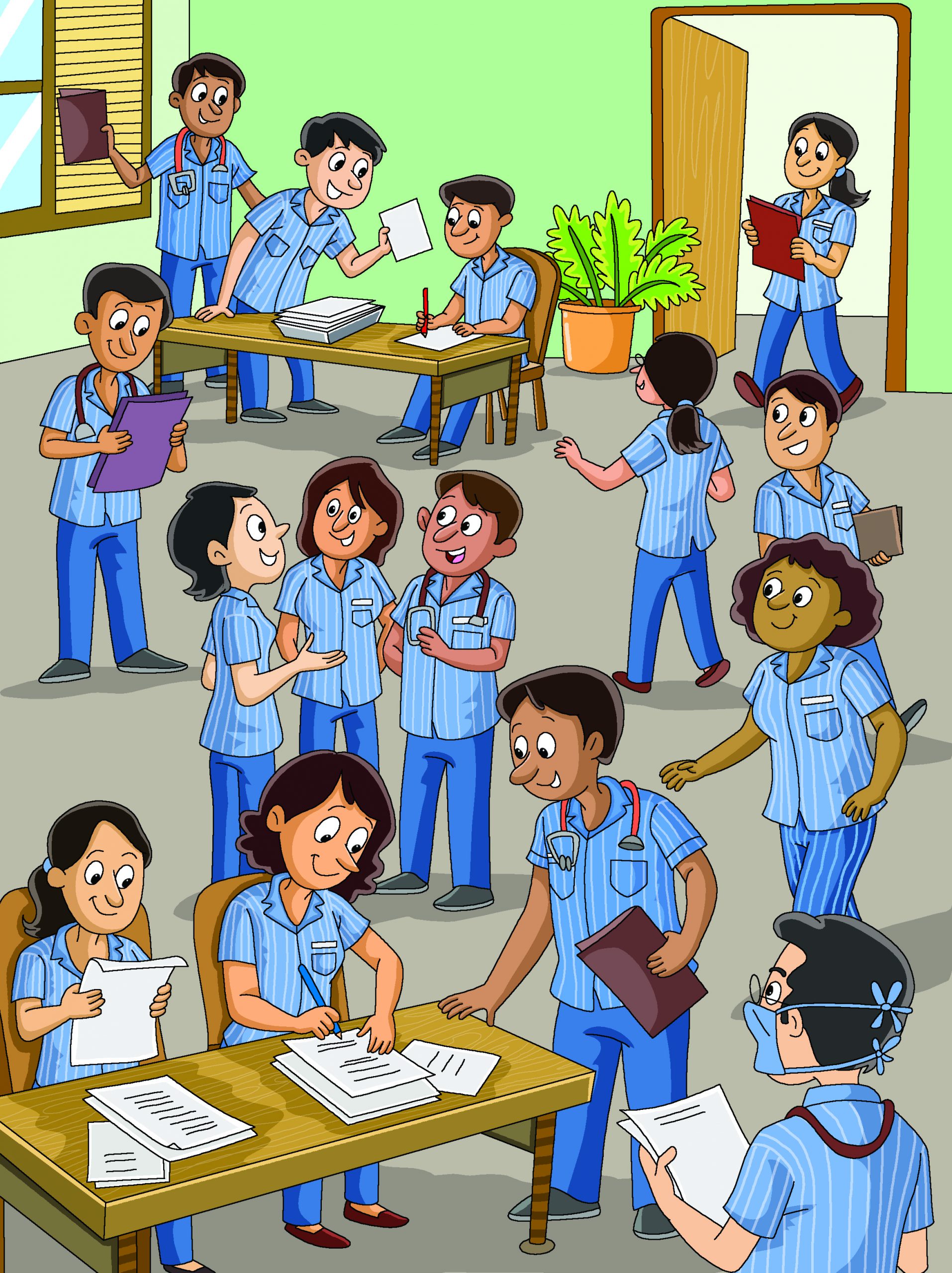
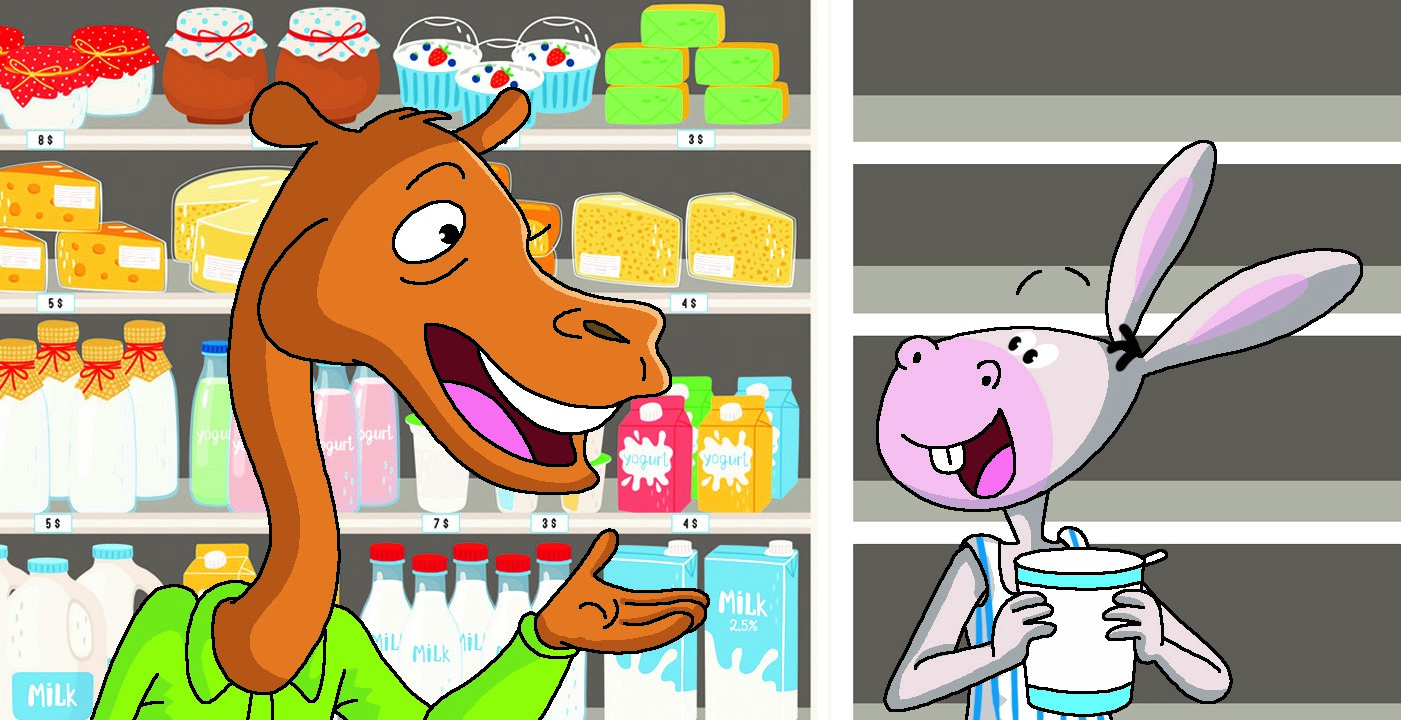
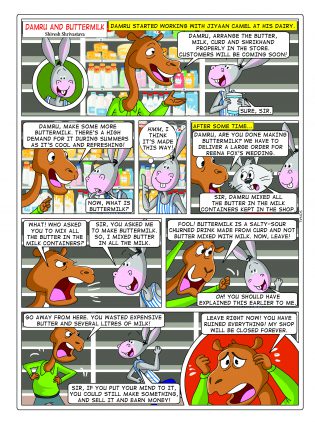
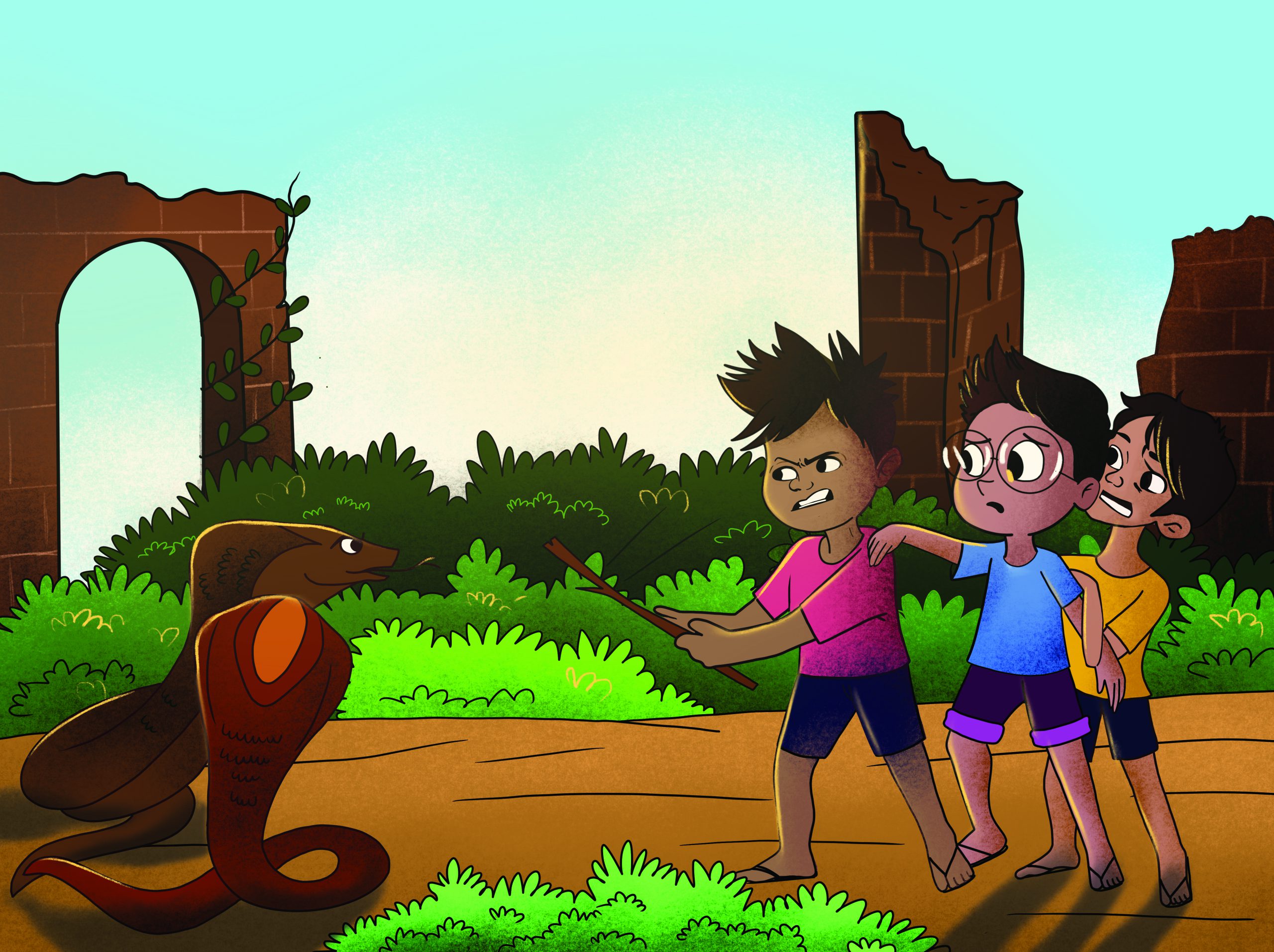
“Yash! Yash! I just learned something interesting!” said Karan, panting.
“Karan! Catch your breath first? Now, tell me, what it is?” said Yash, resting his bat on his shoulder.
“About three kilometres from here flows Ratna River. On its shore, there is an old house with a well.”
“What’s special about that?” asked Yash.
“Oh, Yash! Don’t you know? The British have hidden a truckload of treasure inside that well.”
“How do you know there’s treasure inside the well?”
“My grandpa told me that during the revolt of 1857, the British government had hidden its treasure in that well so that the revolutionaries would not lay their hands on it. The British were killed during the revolt, but the treasure is still inside the well. No one has found it till now.”
Yash thought for a while, and then said, “Karan! The treasure in the well can be ours! We’ll do what no one has done!”
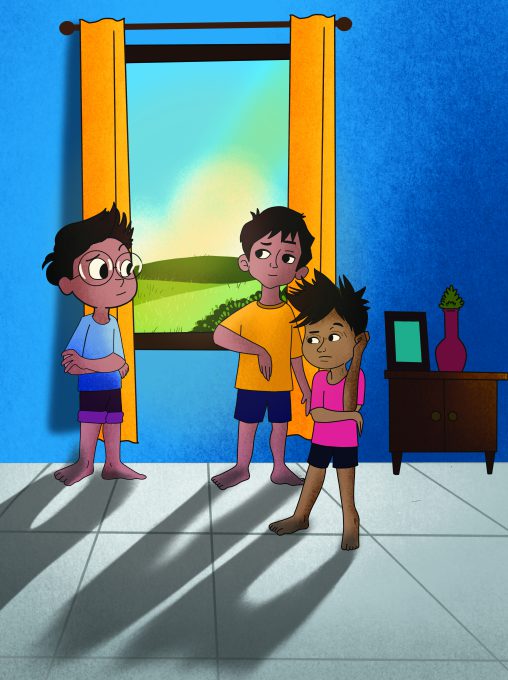
Yash and Karan talked and walked towards their closest friend, Mohan who had an analytical way of thinking.
Mohan loved reading detective stories and had learnt about being a detective through them.
He listened to his friends attentively, and then said seriously, “Hmm! A treasure in the well! We will find it, no matter how hard it is.”
The three of them started drawing up a plan and decided to go on Sunday to find the treasure. They also agreed to collect things that they would need to draw out the treasure.
They collected large bags to put the treasure once they got it, and sticks with pointed ends like spears to fight off any danger they may face. They took a large rope for getting inside the well, and a pickaxe for digging.
On Sunday morning, the three friends set off on their treasure hunt fully prepared.
Their first obstacle was the way to cross the Ratna river. Though the river did not seem to have a lot of water, they didn’t know its depth. They took off their clothes and shoes and put them in a plastic bag.
They used their sticks to measure the depth of the river and started walking across it slowly. They walked through the parts where the water was shallow and avoided the deeper pockets.
They had almost reached the shore when Yash screamed. “Ouch! Ouch!” and jumped and rushed towards the land. Mohan and Karan got scared and followed Yash quickly.
When they reached the land, they found Yash stamping on the ground. They saw that two leeches were attached to Yash’s legs and they had become swollen sucking his blood. Yash tried shaking them off, but could not. He was screaming now.
Hearing the screams, a farmer working in a field near the river came running. He saw Yash stamping and understood what had happened.
He immediately pulled out a small bottle that had white powder from his pocket and sprinkled some on the leeches and they came off Yash’s legs at once.
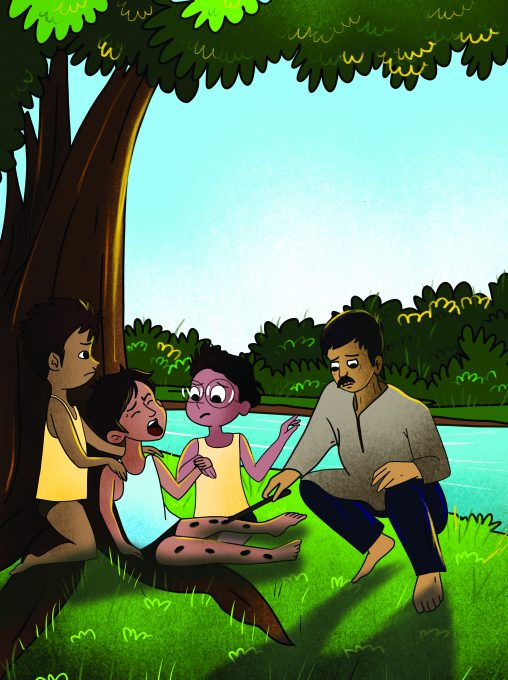
“There are a lot of leeches in this river,” explained the farmer. “We bring our cattle to bathe here and they stick to their legs too. The only way to get rid of leeches is to sprinkle salt on them. That’s why I carry a bottle of salt with me!”
Yash thanked the farmer, and the three friends began walking towards the old house. They had just crossed a field when they heard a buzzing noise. A swarm of bees were coming towards them!
Yash and Karan turned around to run but Mohan yelled, “Put the treasure bags over you!”
The three friends immediately put the empty bags over them. Through the bags, they could hear the bees buzzing and were scared they would get stung. But luckily, the bees flew away and the three friends removed their bags, looked at each other and laughed in relief.
“We didn’t expect our hunt to be full of dangers!” exclaimed Yash.
“Yes, shall we go on?” asked Karan.
“Yes, of course! We’ll find that hidden treasure!” answered Mohan, and the three of them marched ahead.
They soon reached the old house that looked like a ghost house. Trees and bushes had grown through its walls. The windows were broken and covered with cobwebs and looked dark and scary.
But even more scary was the snake in front of the house! Soon, a second snake joined it and the children recognised them as poisonous snakes.
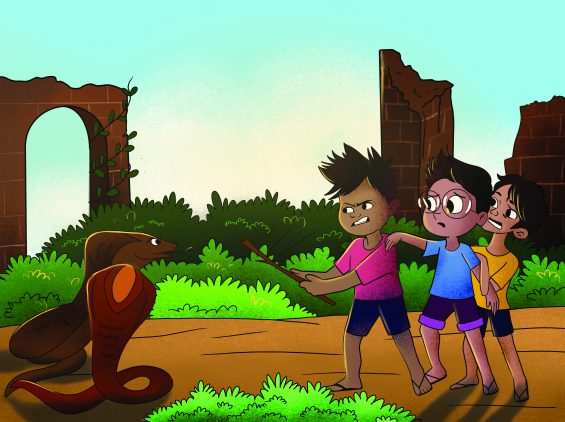
Karan was about to hit the snakes using his pointed stick, but Mohan caught his hand and said, “Don’t hurt them!” he whispered. “Stand still and they’ll go away.”
Sure enough, soon the snakes slithered away.
“You see Karan, snakes are shy. They don’t attack till they feel threatened.
If you had hurt them, they would have attacked us,” explained Mohan.
The three friends then tiptoed through the grounds and finally saw the well. But just before they could go near the well, they heard a rustling noise! Was that some wild animal that would attack them?
They took a step back and looked inside and saw two rabbits running away!
With a sigh of relief, the three went closer to the well and looked inside. It was deep. Plants and weeds had grown along its walls. They could not see the bottom. One of them would have to climb down to get the treasure!
“Mohan, you are the thinnest. You should climb down!” said Karan. Yash is heavy and we will not be able to pull him out.”
Yash laughed but was secretly happy that his weight had saved him from climbing down. He did not want to get stuck inside the well! Mohan tied one end of the rope to a tree trunk and tied the other end to his waist.
“Yash and Karan, release the rope slowly.
Once I reach the bottom, I’ll find the treasure and put it in the bags. Then I’ll shout so that you can pull me up.”
Mohan balanced himself along the side of the well and slowly started climbing down easily. When he reached the bottom, he looked all around for the treasure that was not there.
Instead of the gold coins, he was expecting, he saw a scared white baby rabbit that tried to hide when Mohan reached to pat it.
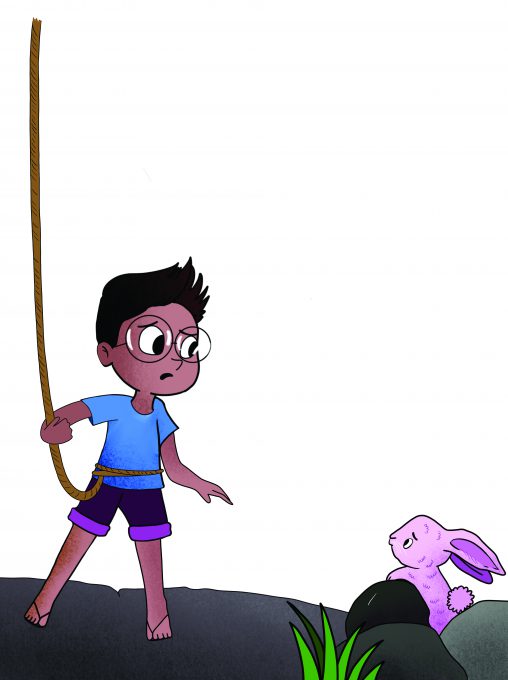
Mohan realised that the baby rabbit must have fallen into the well. The two rabbits that scurried when they had reached the well must have been her parents.
Thankfully, there was no water in the well, otherwise, the baby would have drowned.
Mohan carefully picked up the rabbit and put her in his bag. He used his pickaxe to make some holes in the bag for her to breathe. He took the bag on his back and tied the pickaxe to the rope. Then he called Yash and Karan to pull him. Yash and Karan were thrilled because they thought that Mohan had found the treasure. They started pulling the rope with all their might. Mohan, too, started carefully climbing upwards.
When he reached the top, Yash caught Mohan’s hand and pulled him out.
They were all exhausted and lay flat on the grass for some time.
Then Yash could not hold himself and picked up the bag Mohan had dropped on the ground and opened it. He wanted to see what was the treasure they had found!
But the treasure inside the bag was scared of Yash and started jumping. Yash dropped the bag in fear and Mohan took the rabbit out of the bag and told them that this was the only treasure he found inside the well.
Karan said, “Mohan, you are kind. I wish everyone was as kind as you are. So many animals can be saved by our small acts of kindness.”
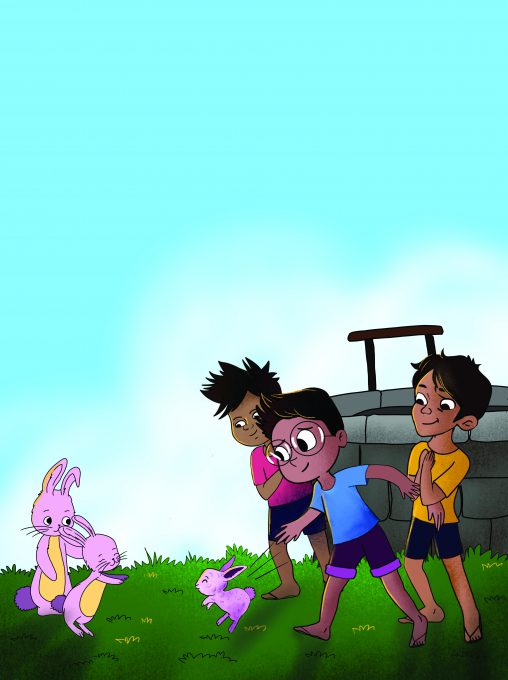
Just then, they saw the rabbits coming back looking for their young one. Mohan released the baby rabbit in the direction of her parents. The rabbits were overjoyed upon being reunited. The three friends were also overjoyed—the treasure they found was a unique one.
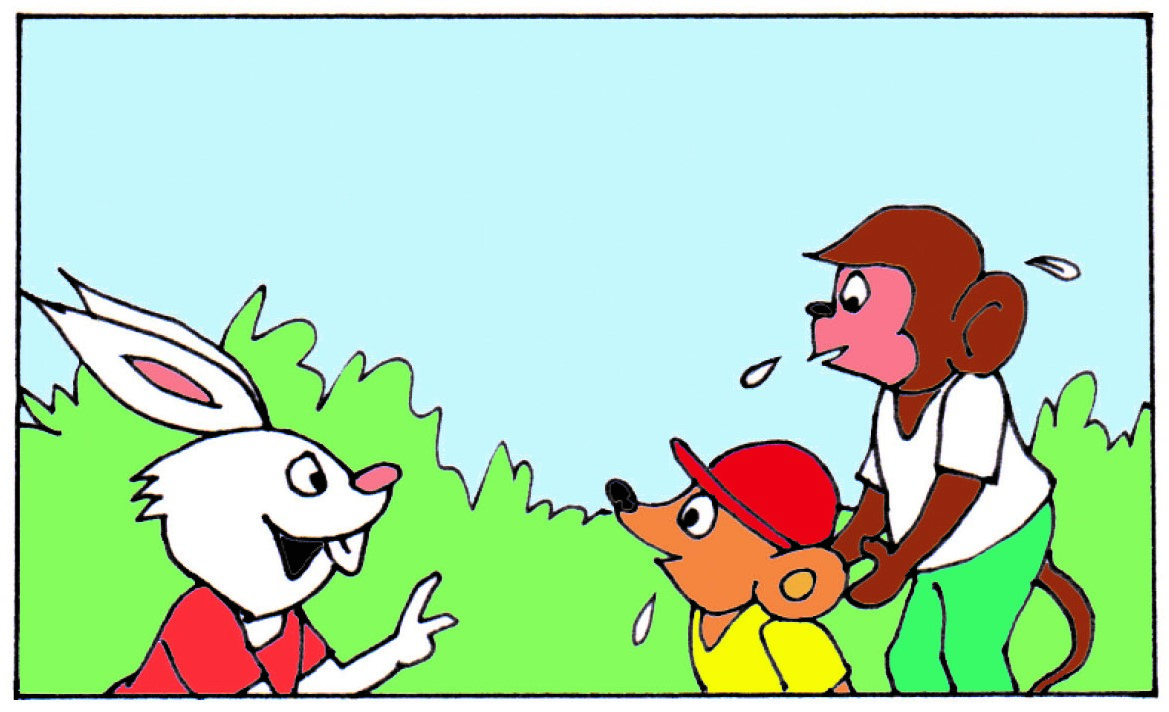
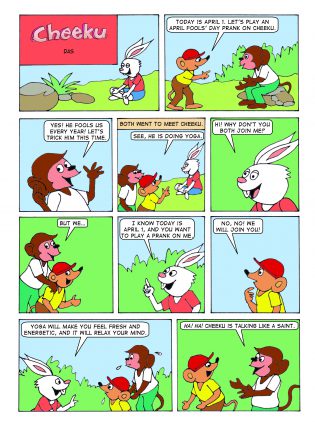
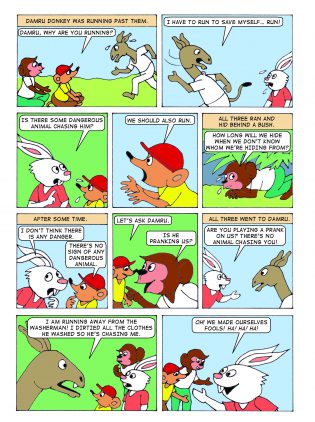
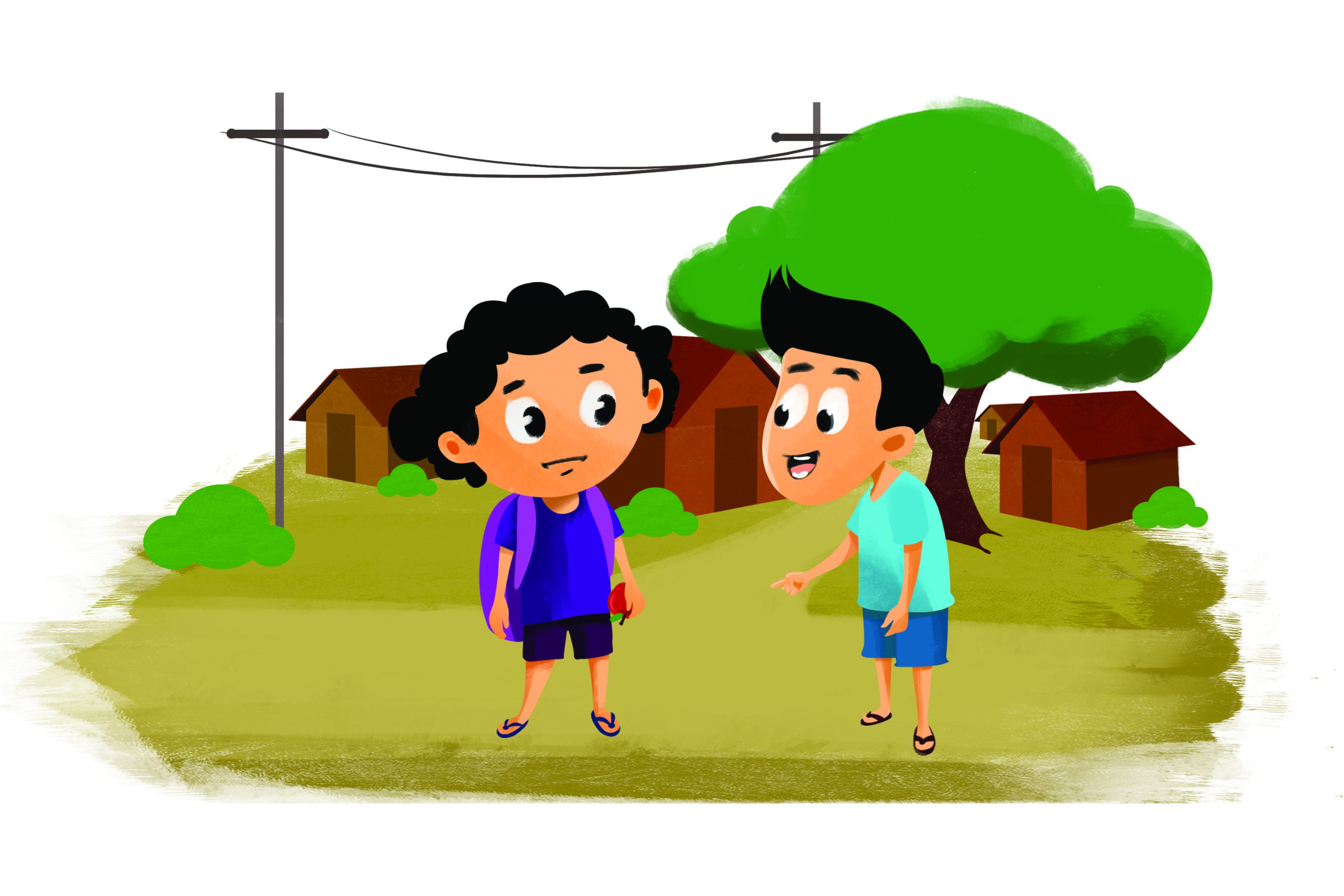
Kittu was walking down the road, holding an apple in one hand and a sack in the other. He met Venkat on the way.
“What’s with the apple and the sack?” asked Venkat, curiously. “That apple looks delicious! I love apples.”
Kittu shook his head. “Oh no, the apple is for someone else.”
“For whom?”
“If you must know, it’s for Mrs. Natrajan who lives at the end of the road.”
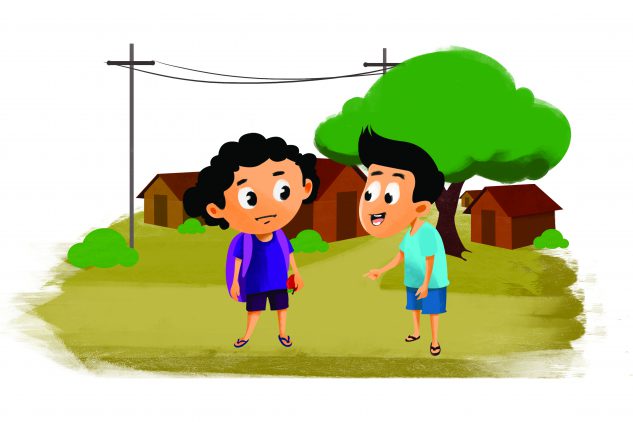
“That crabby old lady? She’ll bite your head off!” warned Venkat.
“Oh no, she won’t,” answered Kittu, confidently.
“You never give things without a reason.
Why are you giving her an apple? Asked Venkat, narrowing his eyes.
“What do you mean? I have no motive!” said Kittu, opening his eyes wider.
“Don’t pretend with me. I know you better!” Kittu sighed. Mrs. Natrajan has a mango tree in her garden. And those are the best mangoes I have tasted! She loves apples and I love mangoes. So I thought I will give her this apple and hopefully she will let me take some mangoes. That’s why I am carrying the sack!”
“I knew you would not do something without a reason. Anyway, you can’t carry such a heavy sack. I’ll come and help you!”
“And I am sure you want some of the mangoes for your help,” replied Kittu, as he knew Venkat would not help just like that.
Venkat grinned and said, “Well, if you are that kind, considerate and generous, who am I to refuse?” Kittu threw a nasty look at him but realised that he wouldn’t be able to carry the heavy sack by himself, so he agreed to take Venkat along.
Both set out to Mrs. Natrajan house.
As they neared the house, they found her standing outside, yelling at the top of her voice at some kids who were trying to steal mangoes from her tree. She was shaking her hands furiously at them.
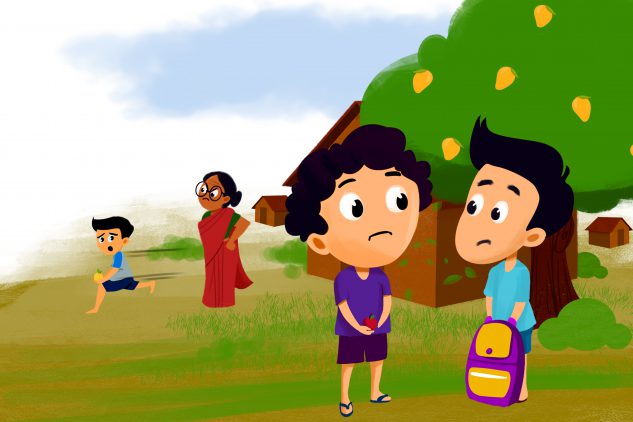
The kids ran away while she was shouting and muttering under her breath at the same time.
Kittu and Venkat stood frozen and looked at each other nervously.
Both were scared now.
Kittu gulped and said softly, “I thought we were the first ones to try and get her mangoes.”
Venkat nudged and whispered, “Let’s drop this idea and leave before she scolds us too.”
Kittu hesitated. He was scared, but the thought of those delicious mangoes wanted him to try. Also, he had an apple.
Surely that would make Mrs. Natrajan kind towards him.
“No, let’s go to her. Don’t forget that I have an apple.”
Venkat hesitated and thought, “What if Kittu is right and he is rewarded with a lot of mangoes? If I don’t help Kittu carry the sack, then Kittu will not even share one mango.” So Venkat agreed to go with Kittu.
Both of them walked up to Mrs. Natrajan and stood before her.
She turned towards them and looked at them.
She had a scowl on her face and when she spoke, they felt she was barking, “What do you want? Mangoes, I bet?”
Both of them got more nervous.
Kittu put on a fake smile and extended the apple towards her.
“For you,” he said.
Mrs. Natrajan looked suspiciously at it and asked, “For me? Why would you bring me an apple for no reason? Is it some sort of a joke?
If yes, then you will be sorry. I mean it. Now run off, you two,” she yelled.
Kittu said smoothly, “No, ma’am, this is a gift for you. It is not a joke. Sweet apple for a sweet lady.”
Venkat looked at him in wonder. He had never heard Kittu speak so sweetly before.
Mrs. Natrajan frowned. Then she looked at the apple and her frown cleared. She almost smiled, and said, “That is very nice of you, boy.”
She took the apple from Kittu and looked it over.
She loved apples so she didn’t waste any time biting into it.
The next moment, she spat it out.
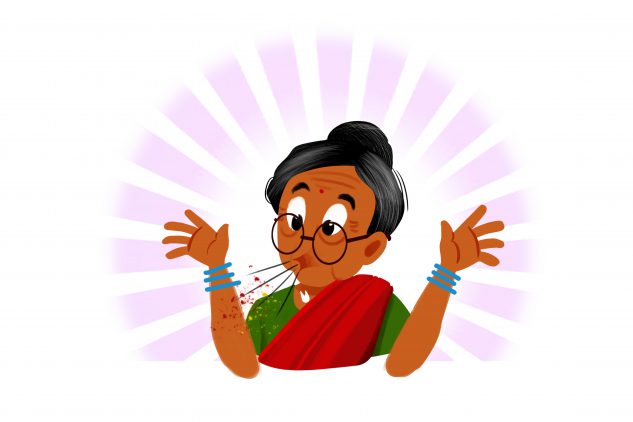
“Blech! Rotten apple! How dare you give this to me?” she yelled.
She threw the apple down and ran towards them.
Kittu and Venkat ran with their empty sack and with Mrs. Natrajan chasing them.
Breathless, Venkat said while on the run, “You and your dumb ideas!”
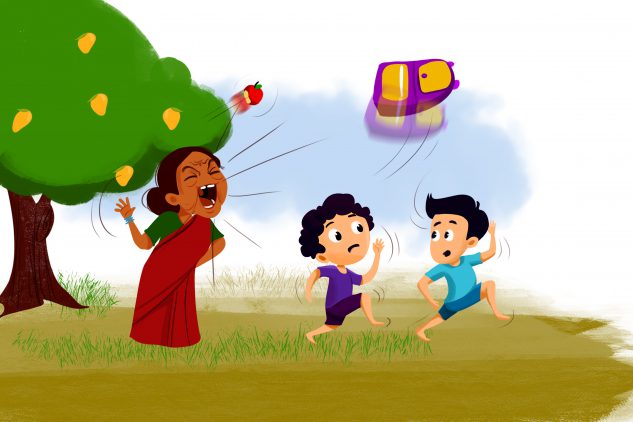
Kittu replied, “How was I to know that the apple was rotten? I found it in our backyard a few days ago. Now, I think my mother must have thrown it out.”
Shocked, Venkat glared at Kittu. “Now you tell me!”And they both ran to save themselves.